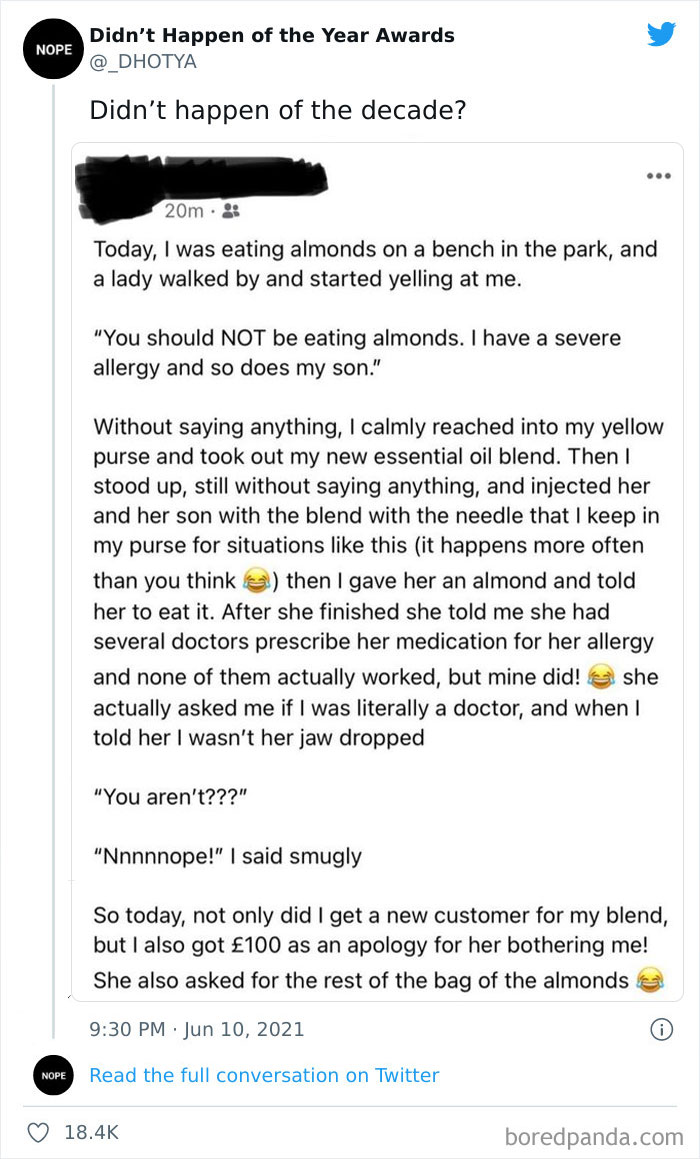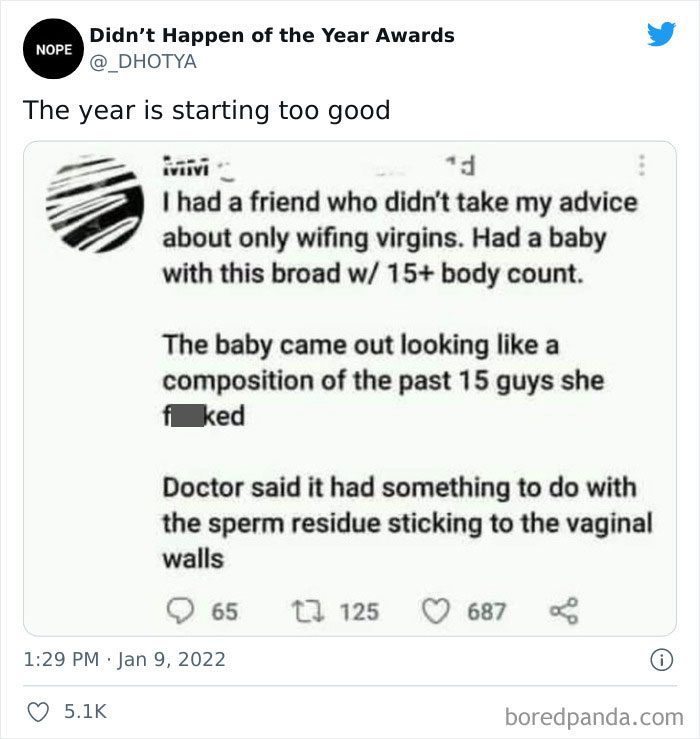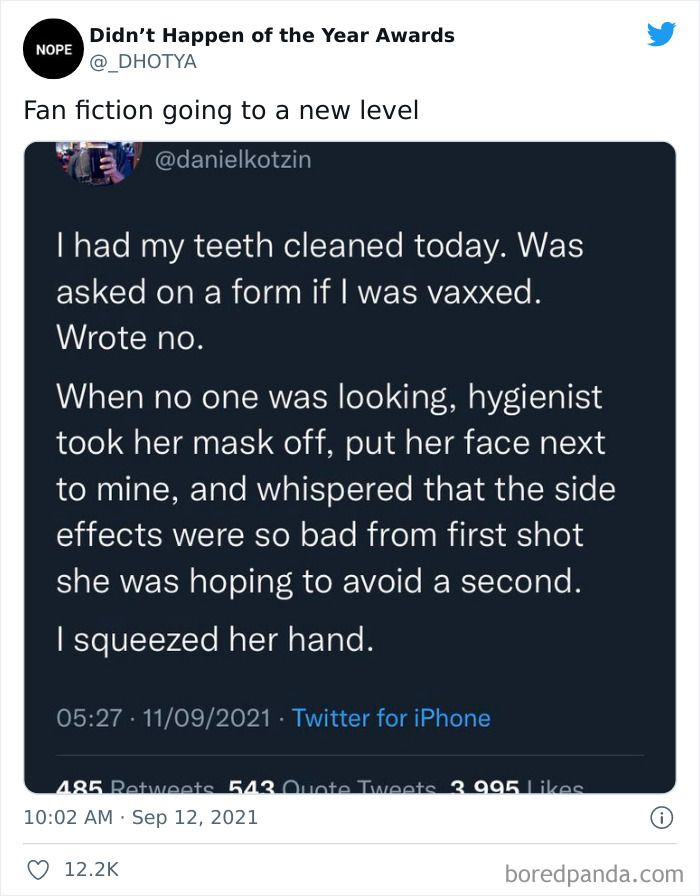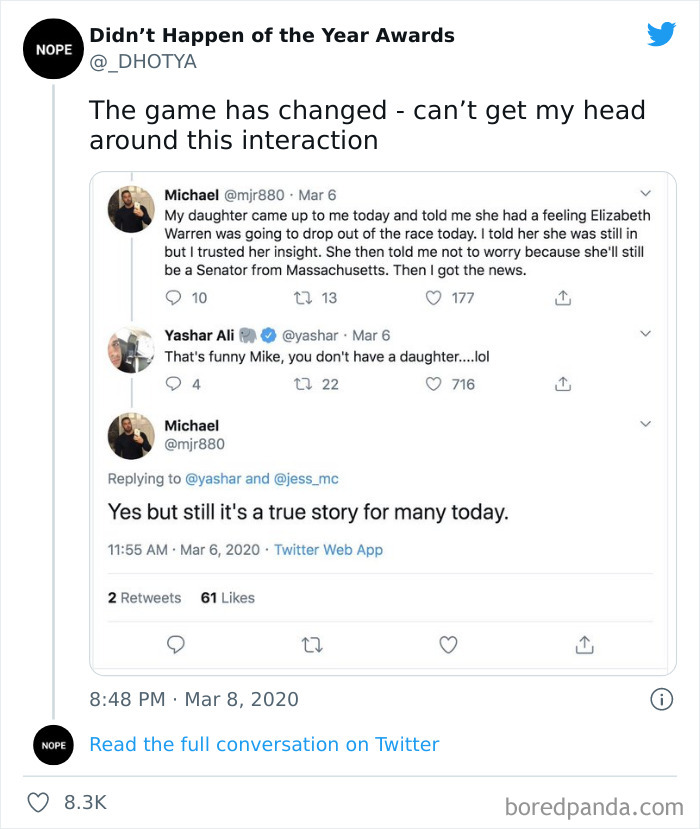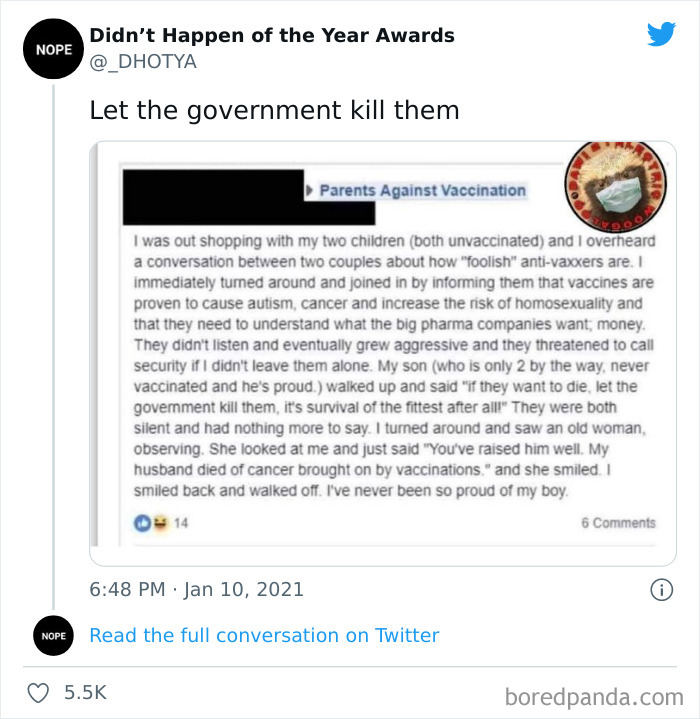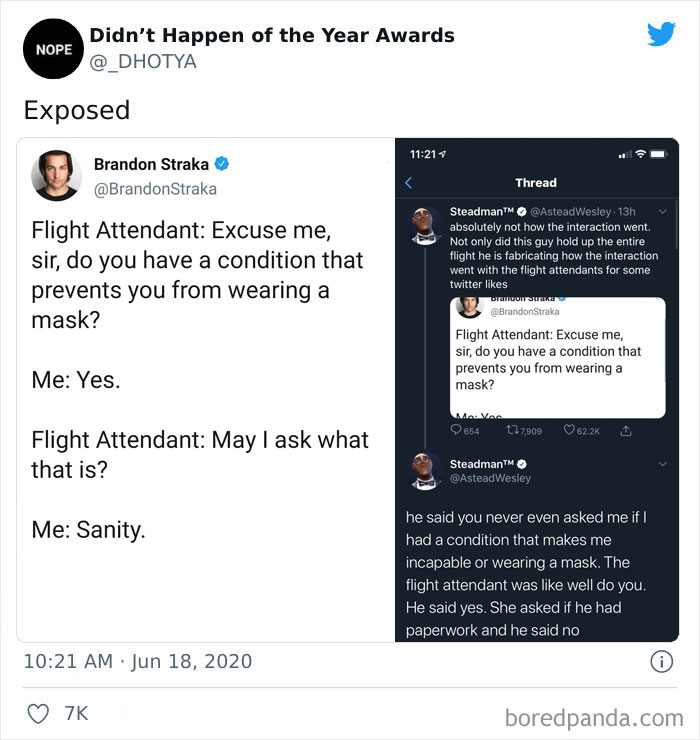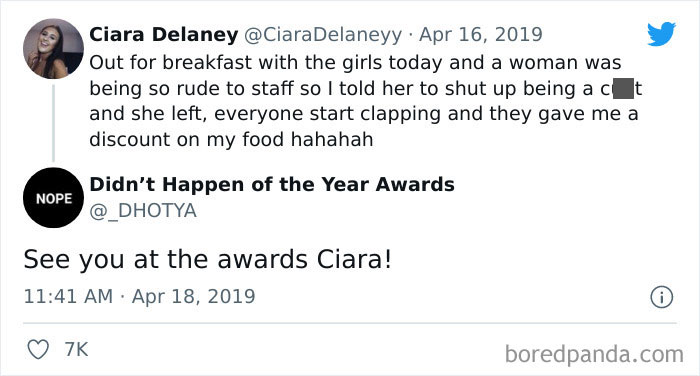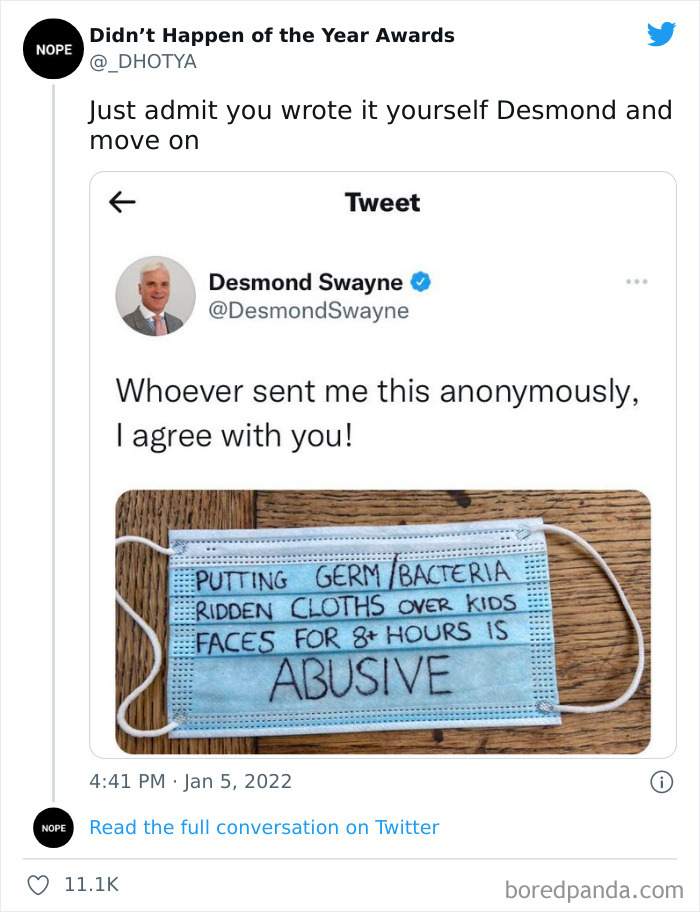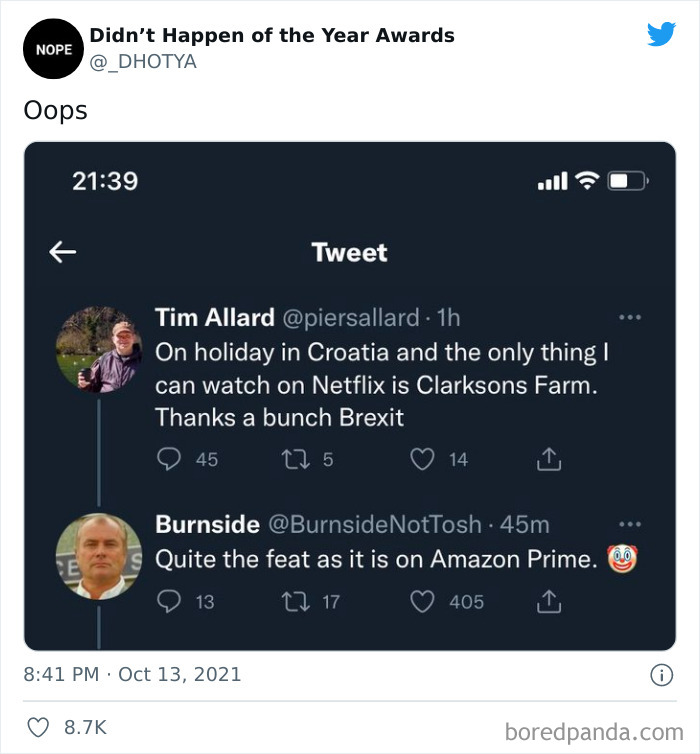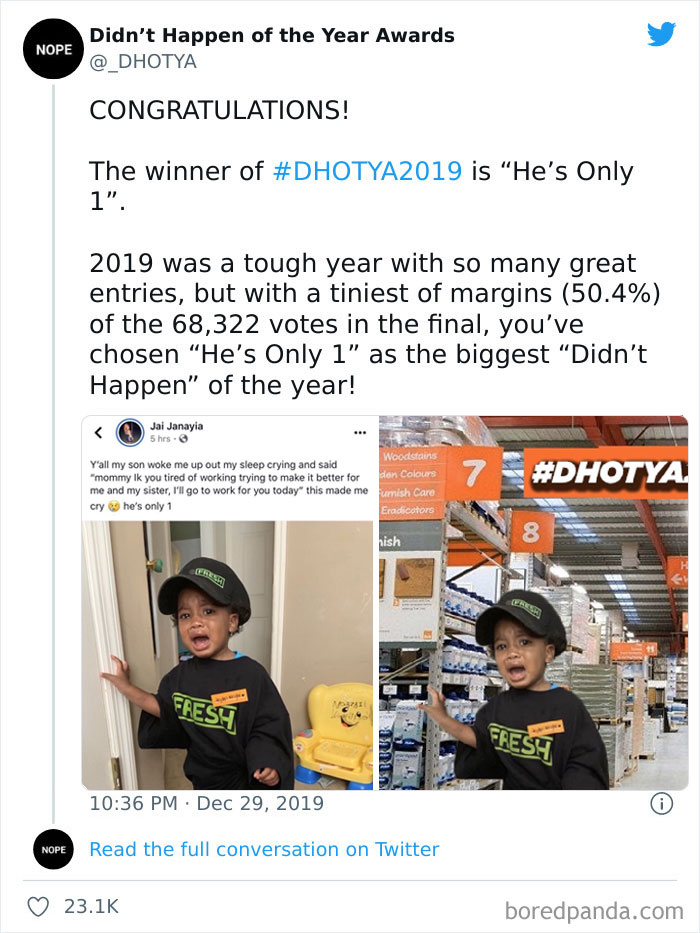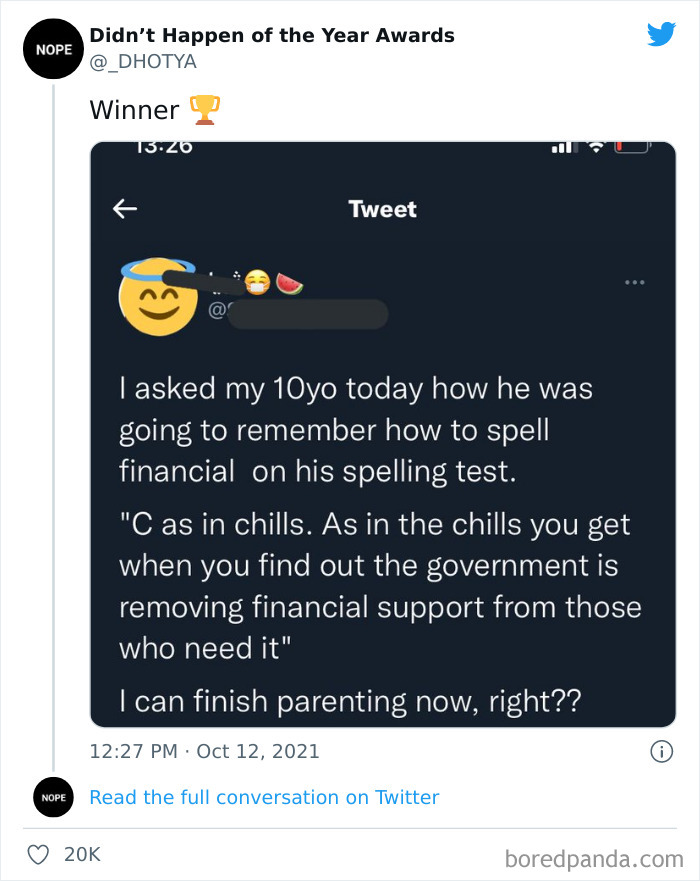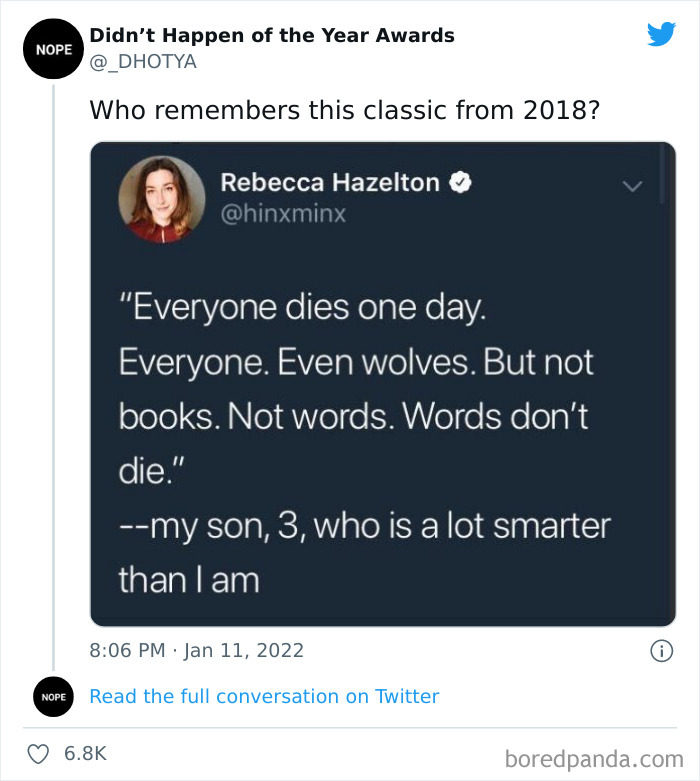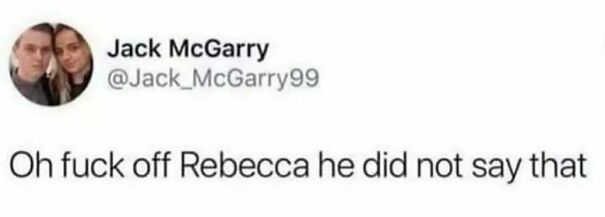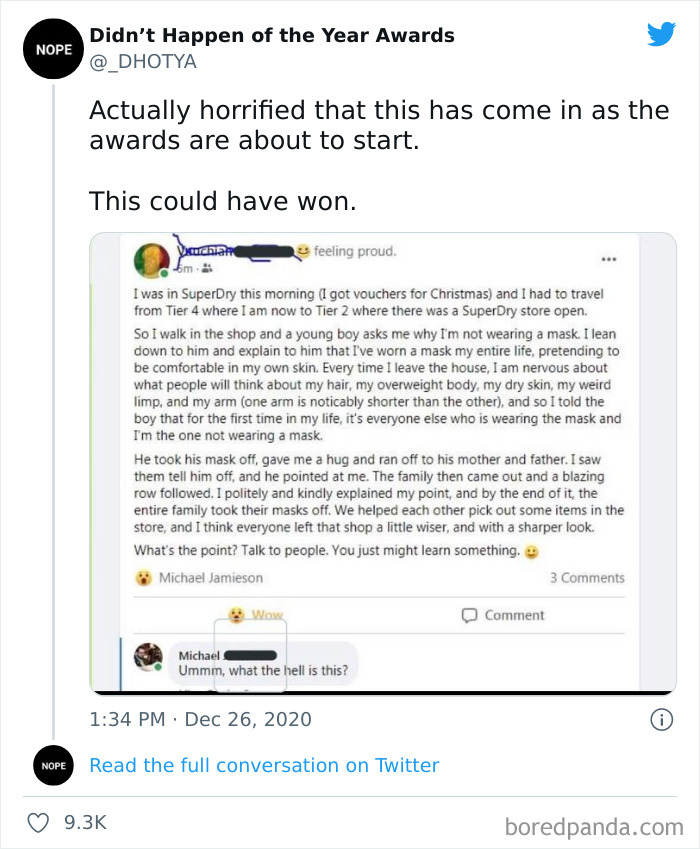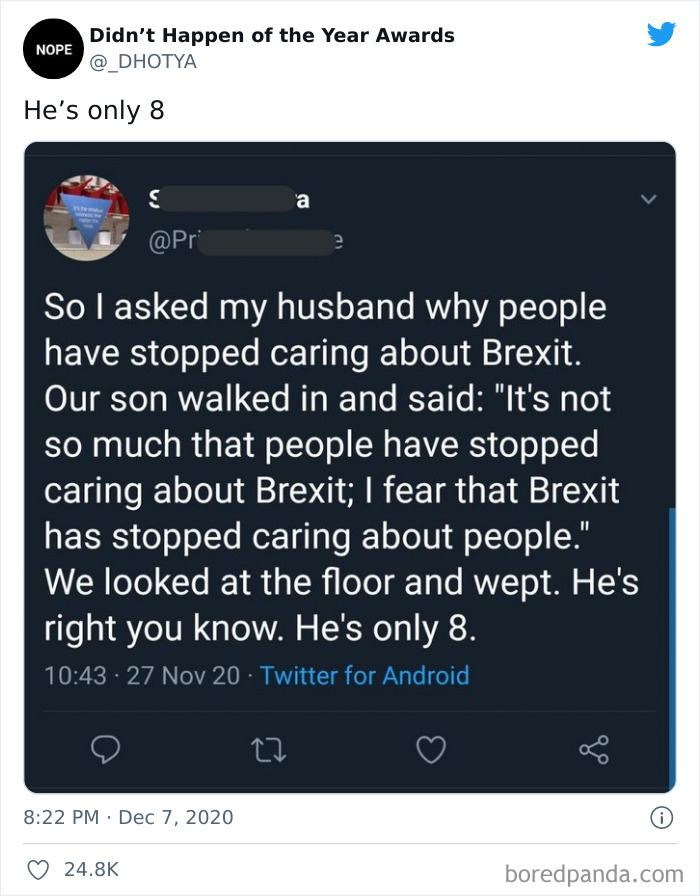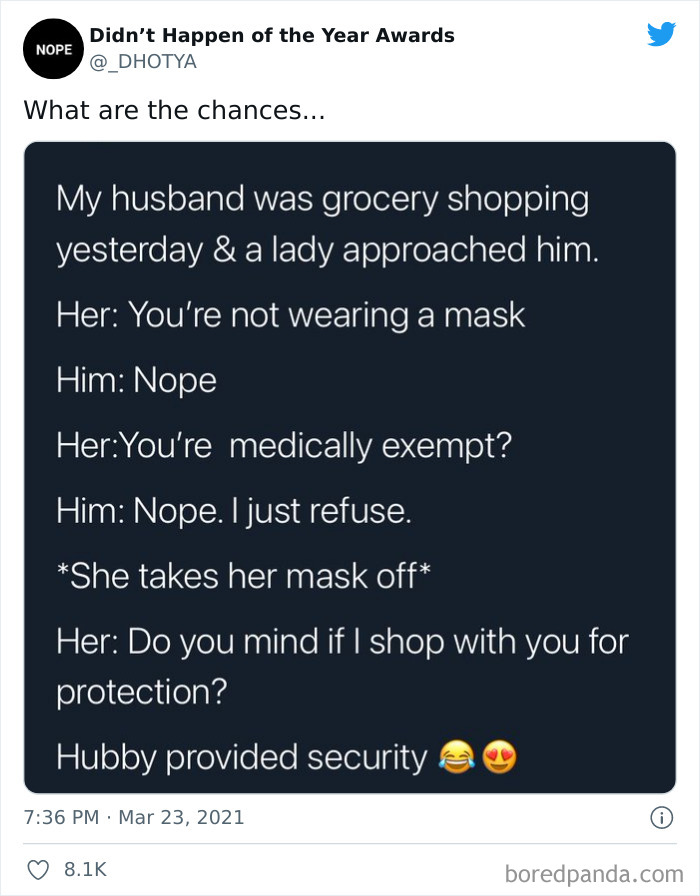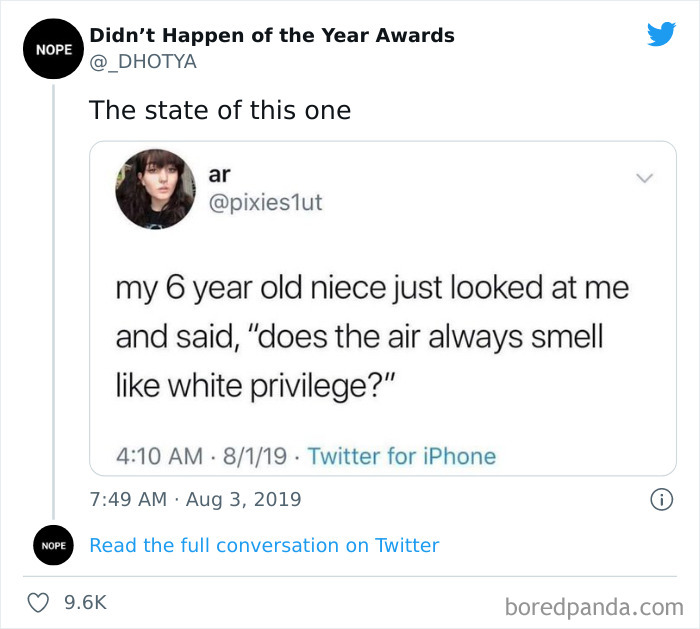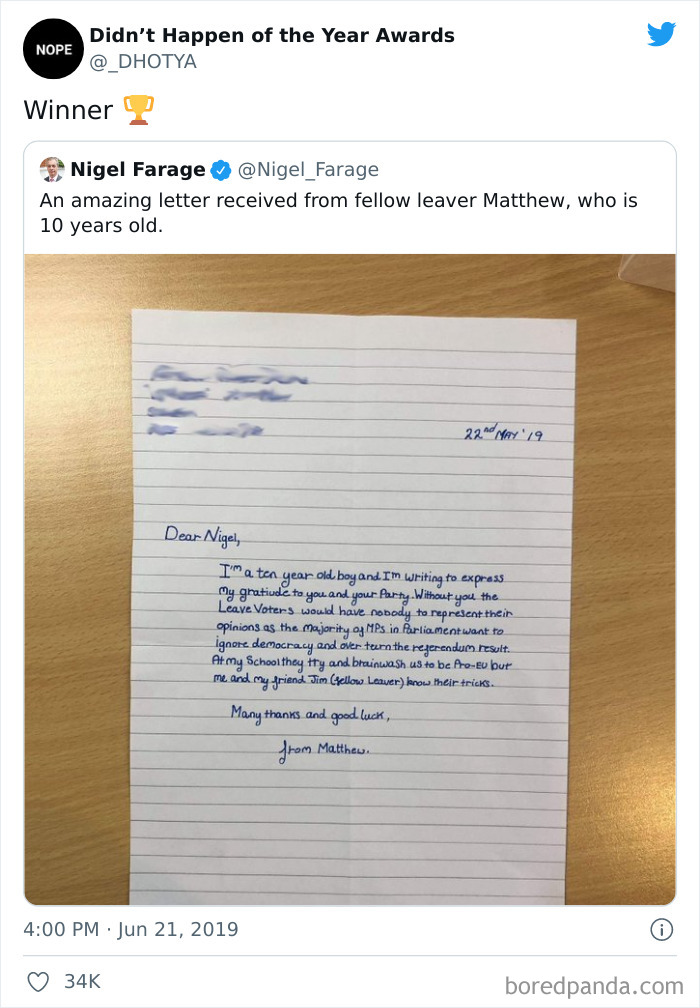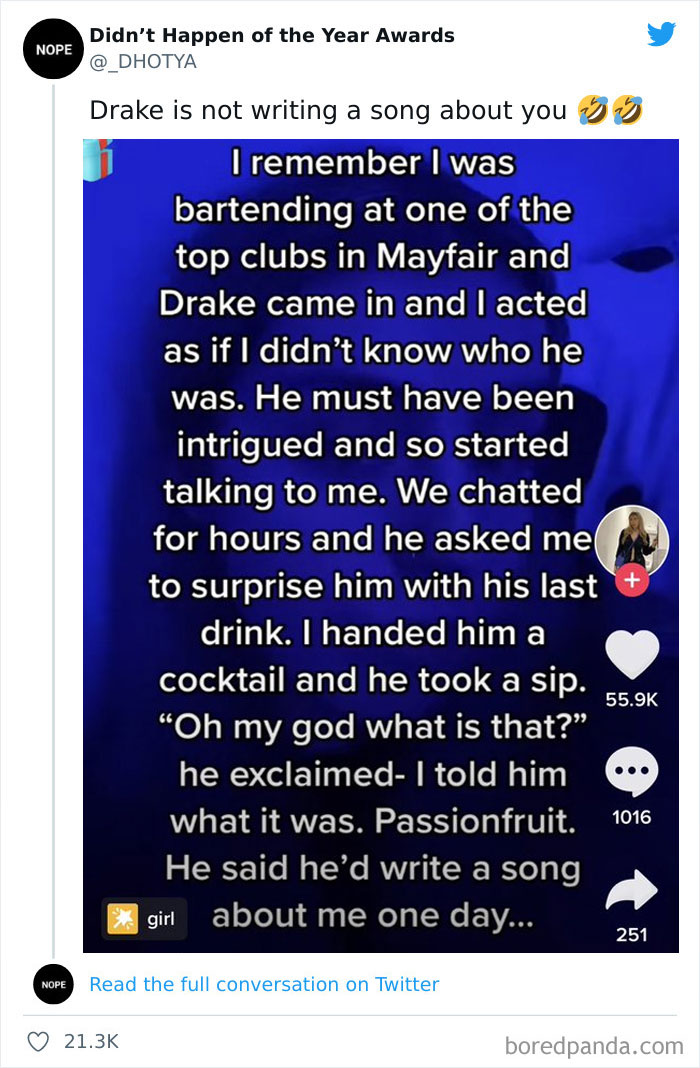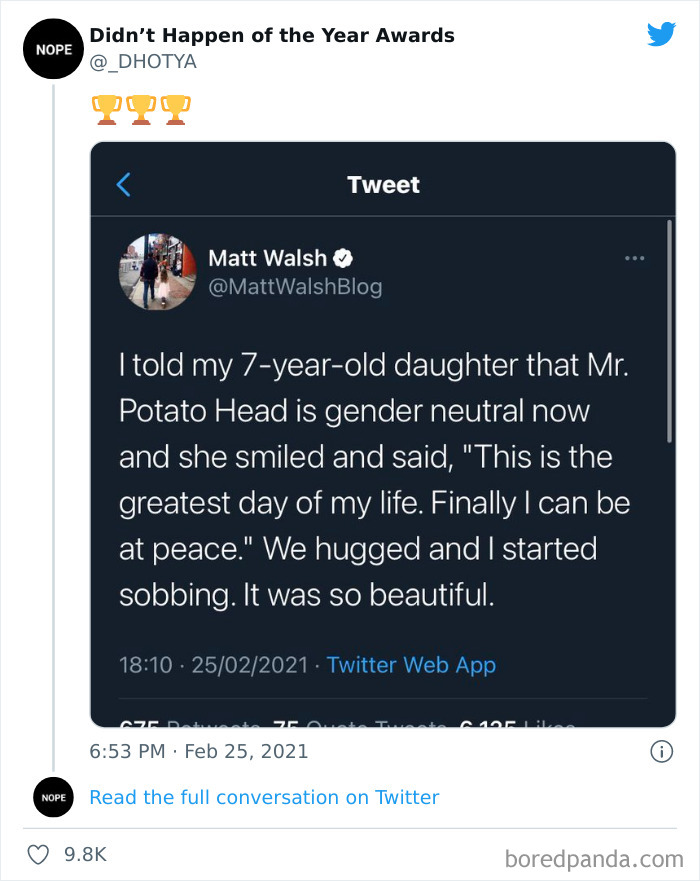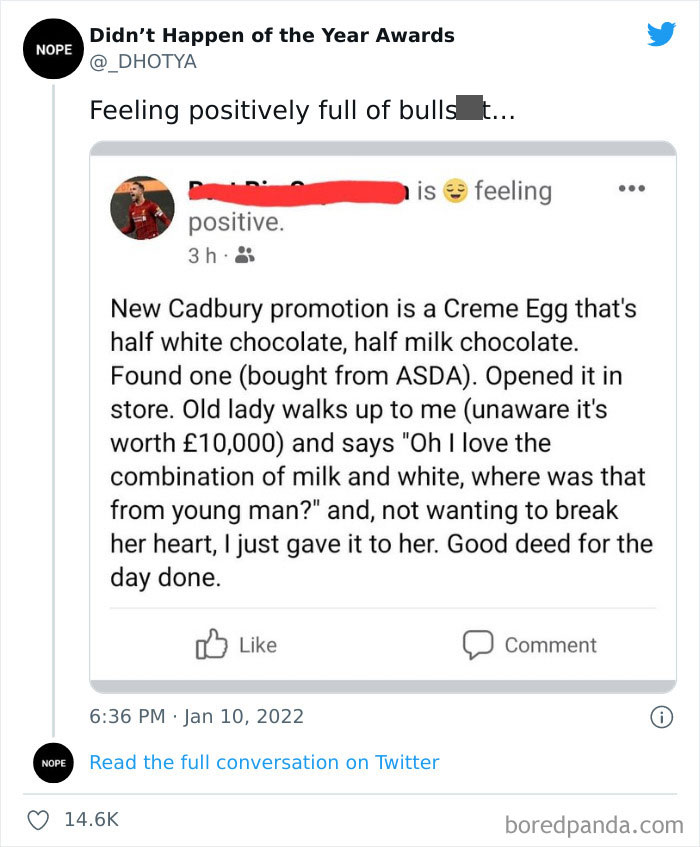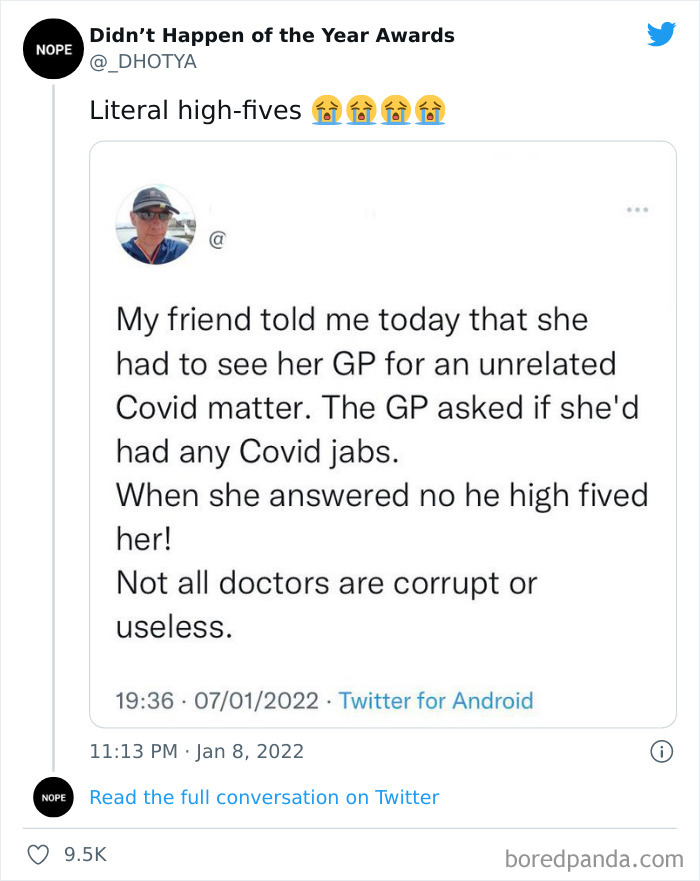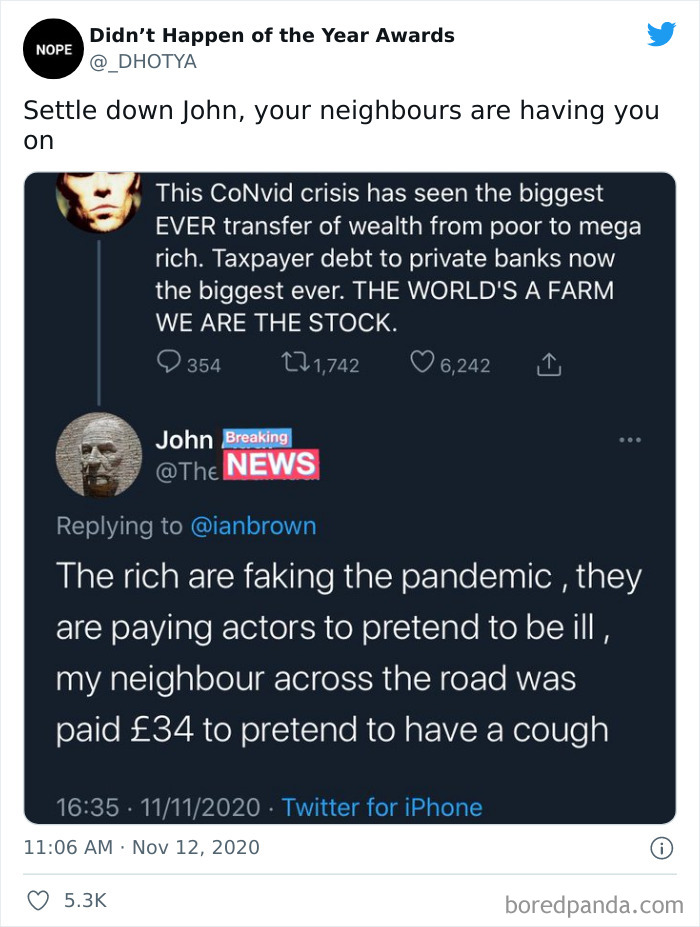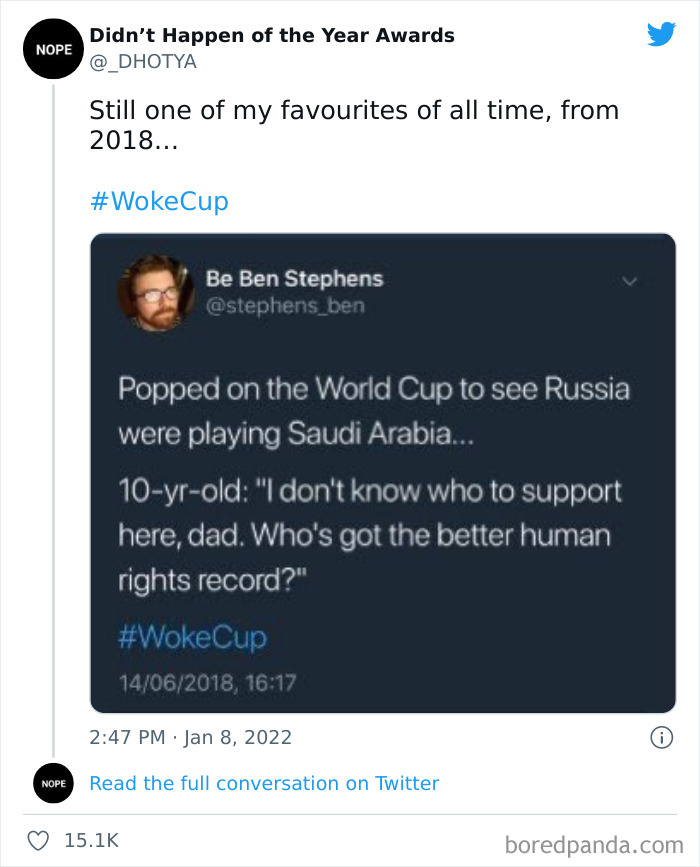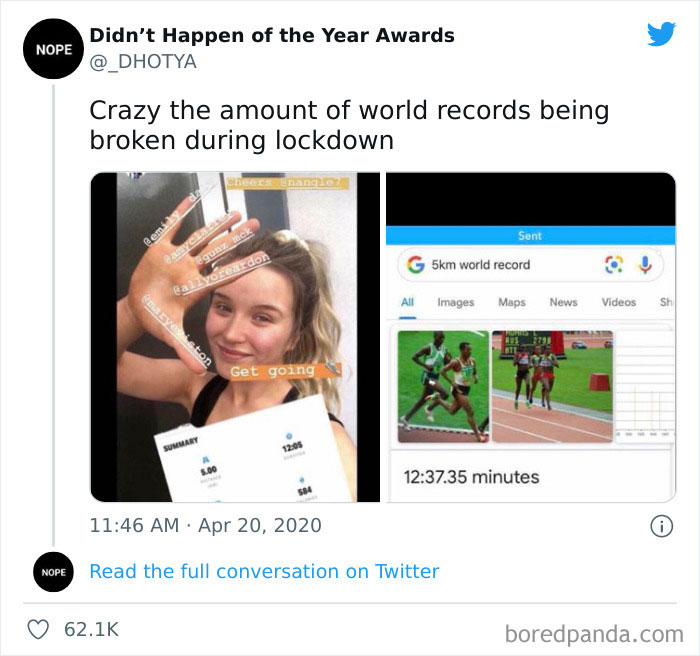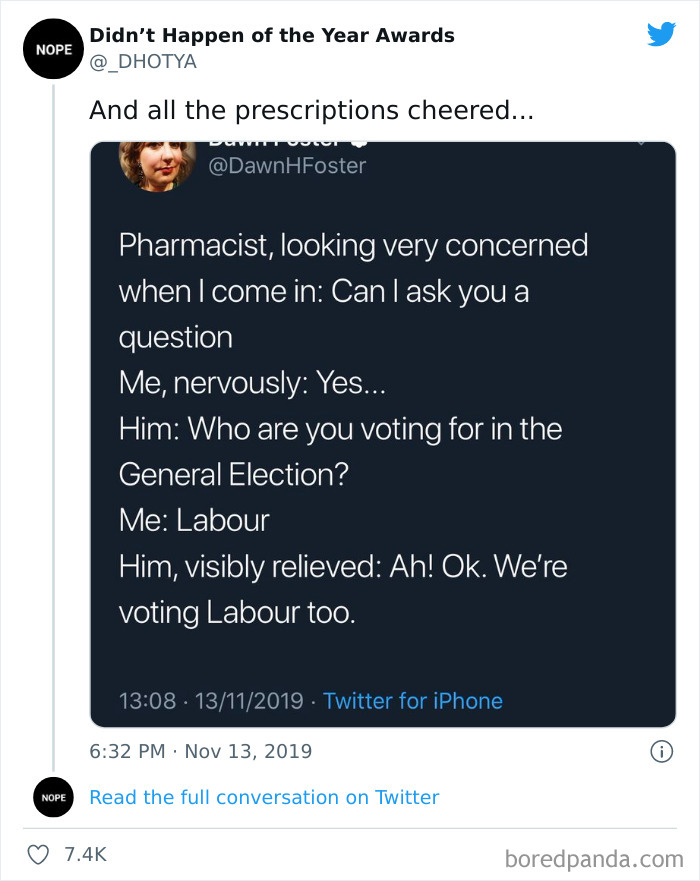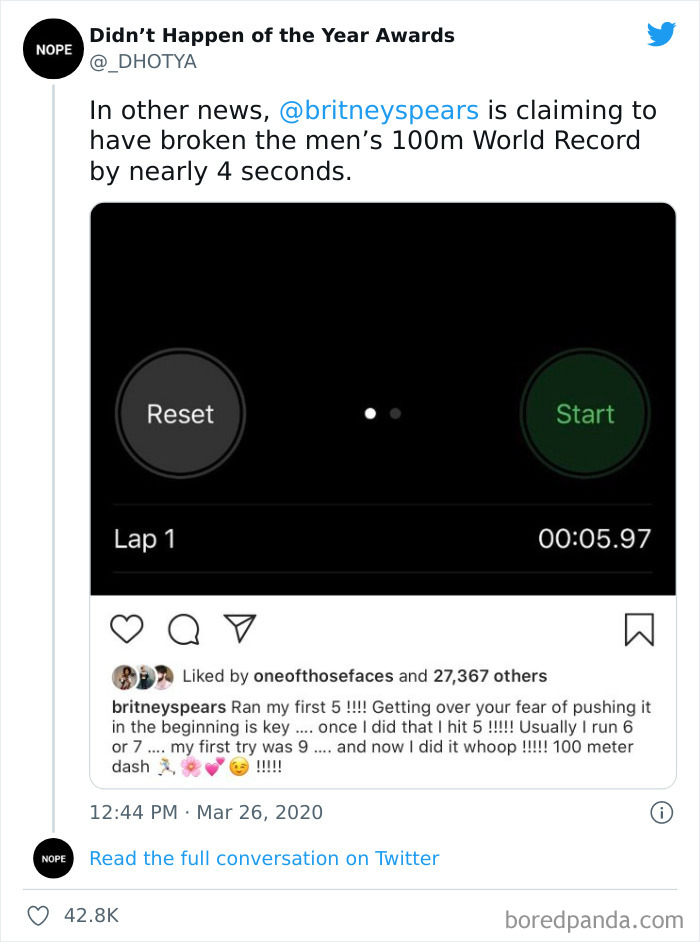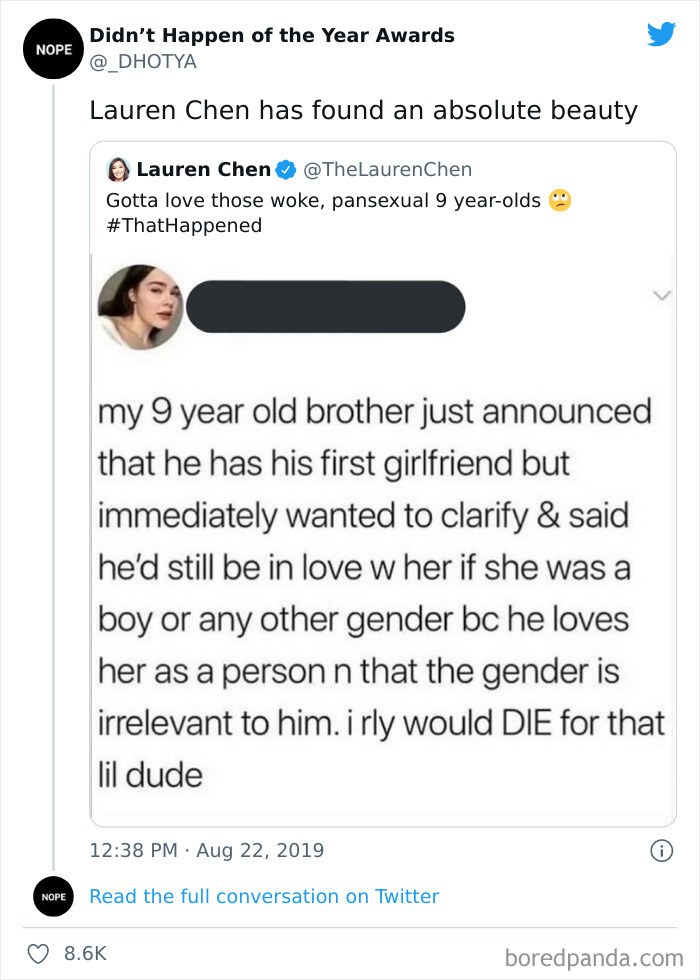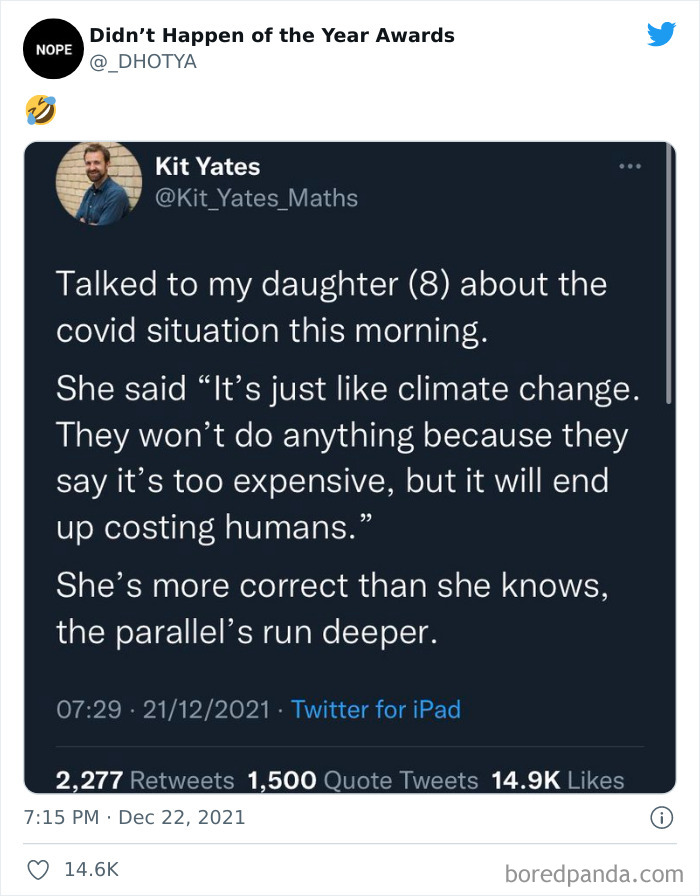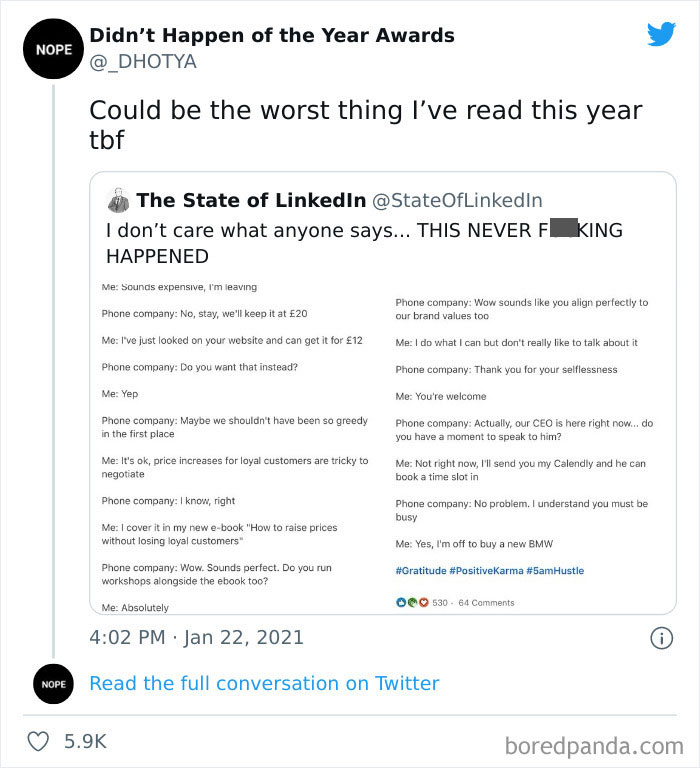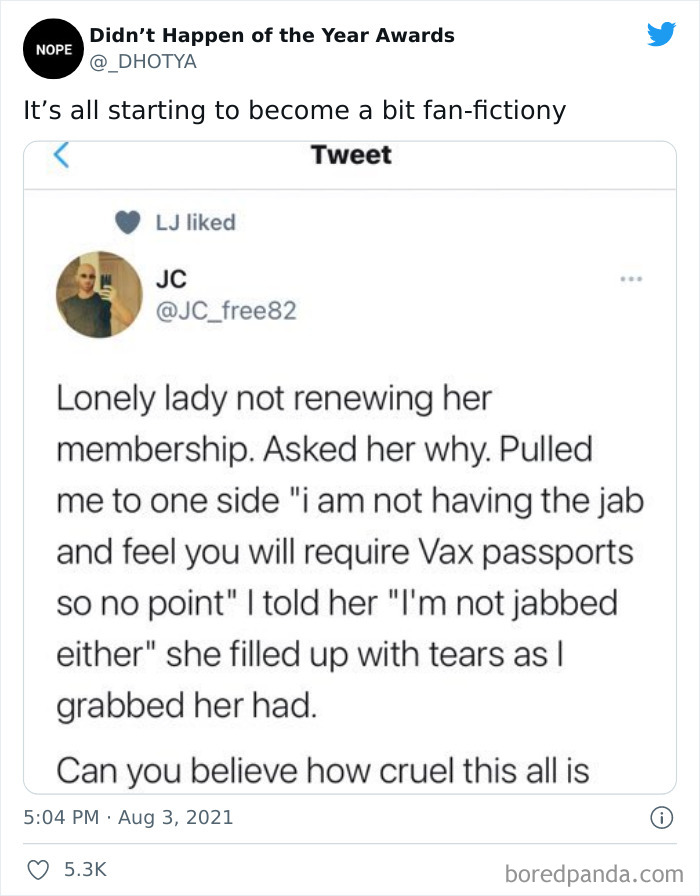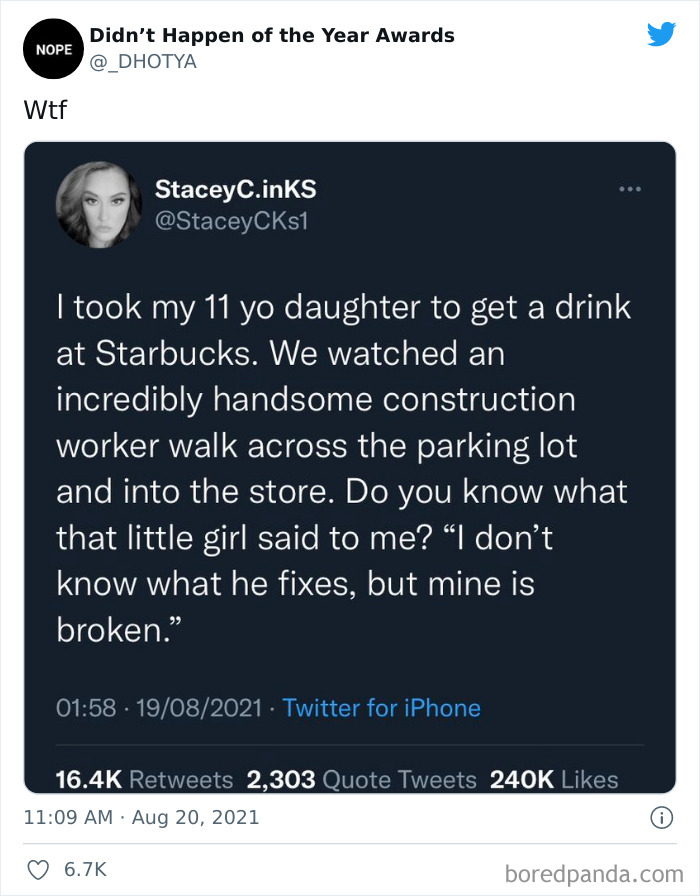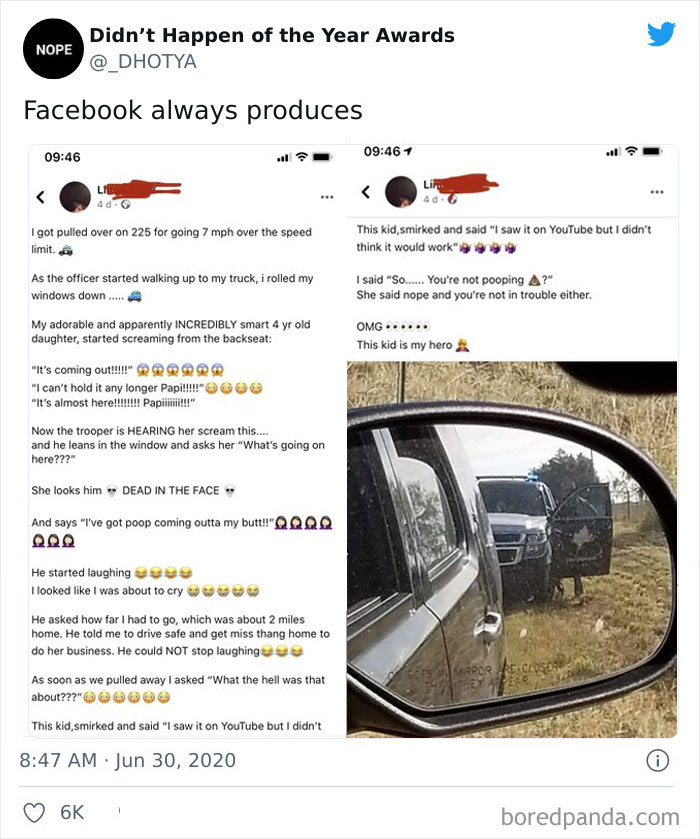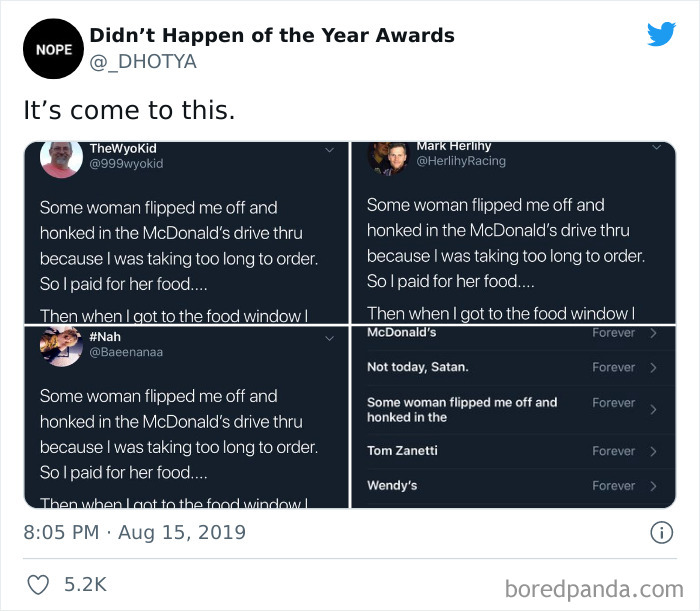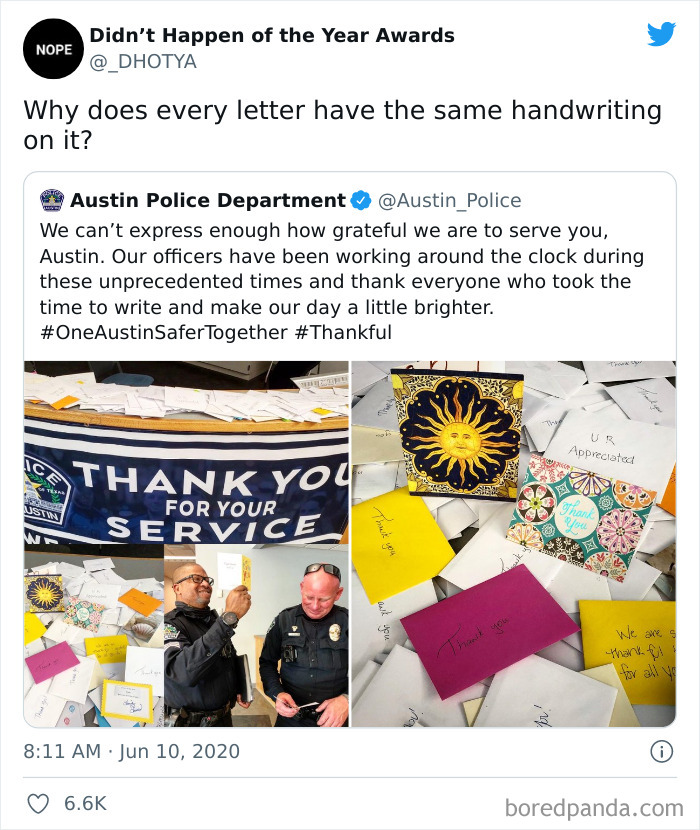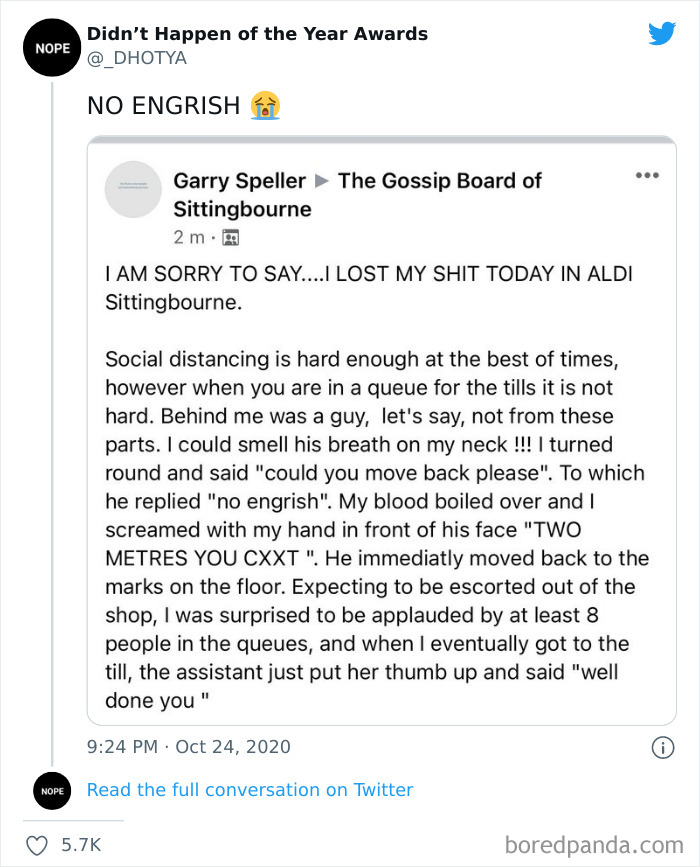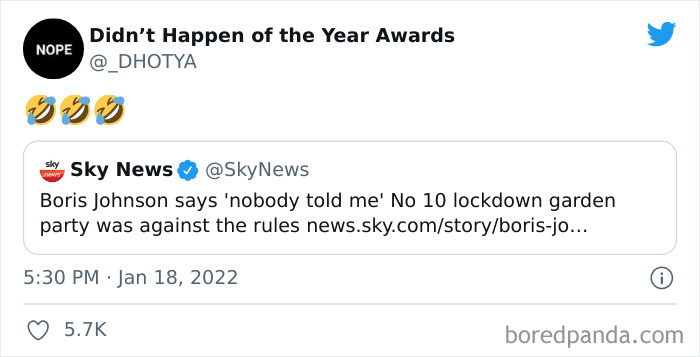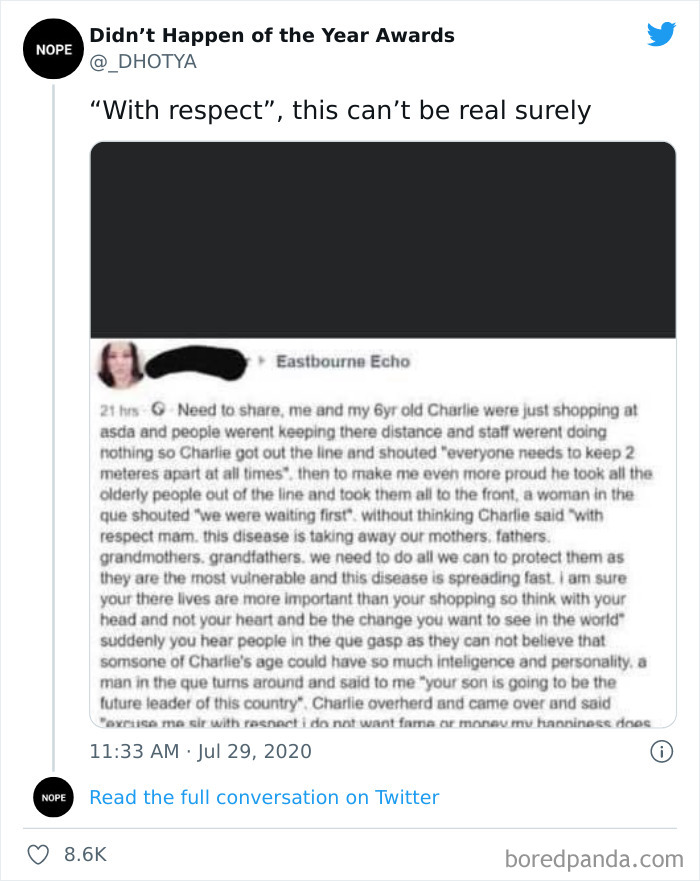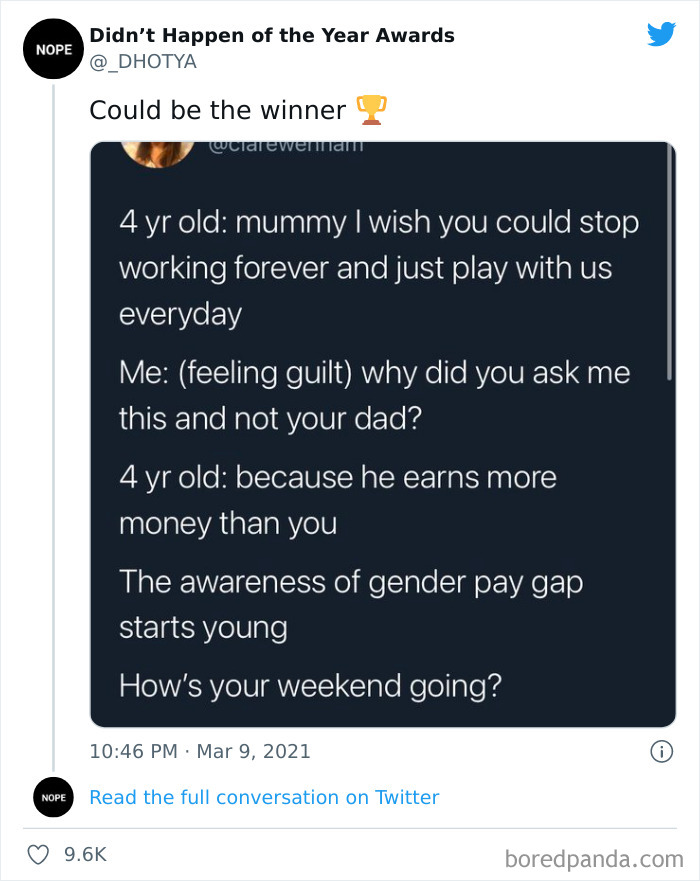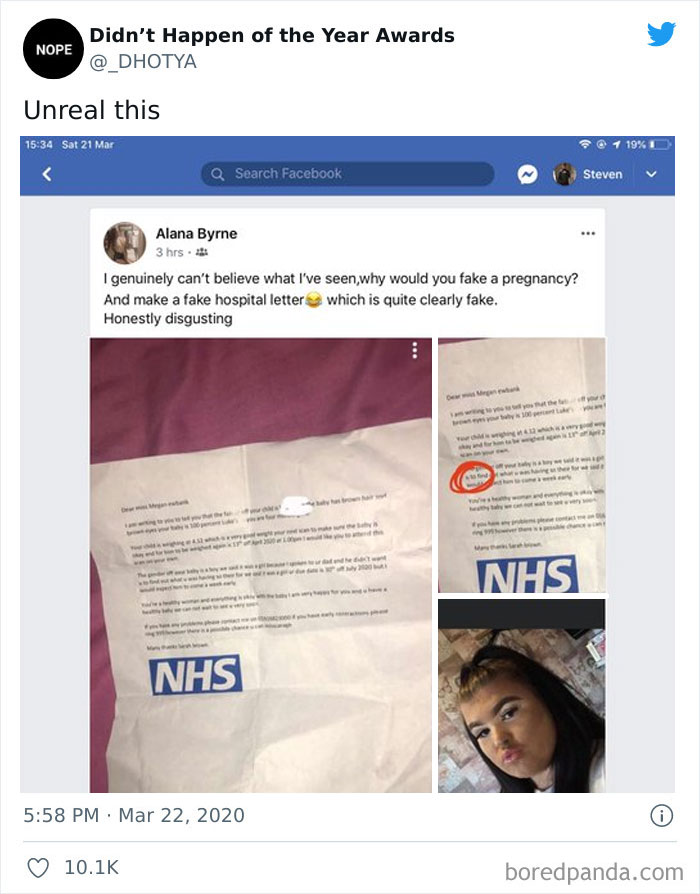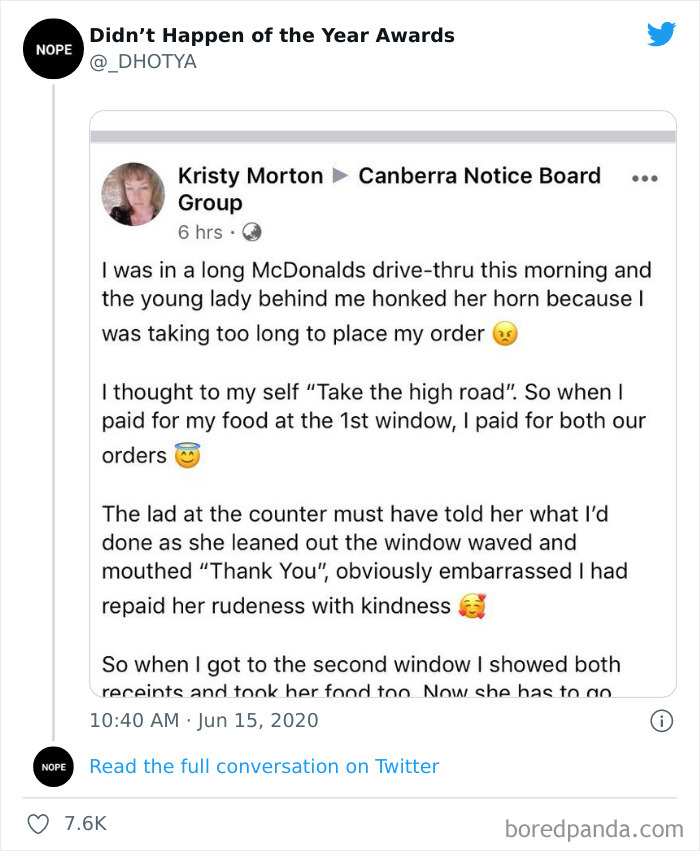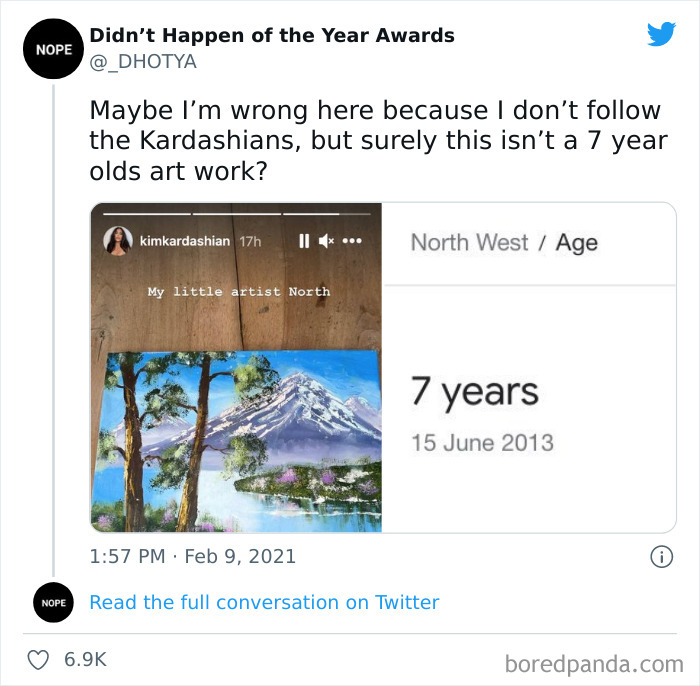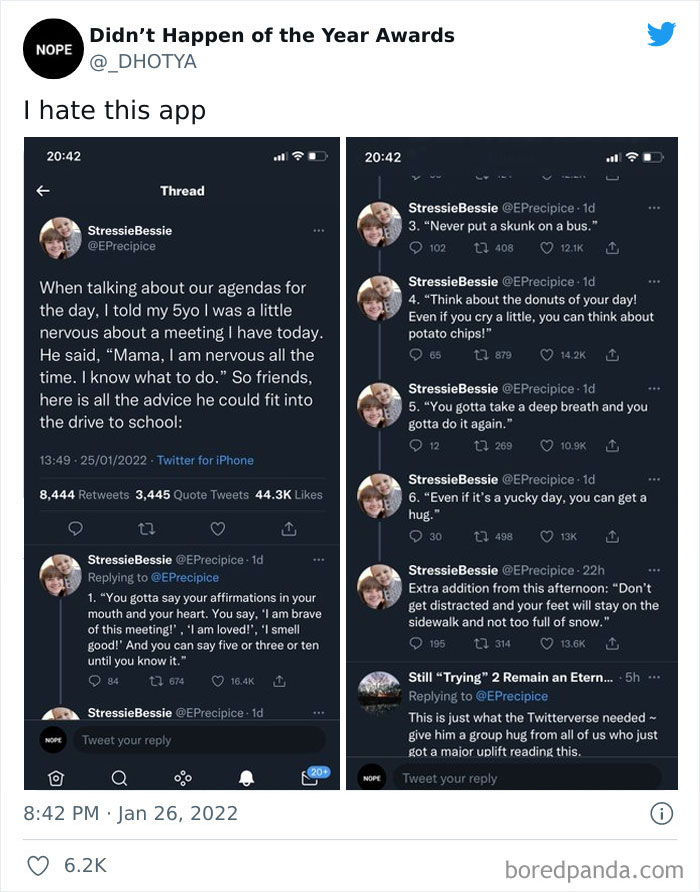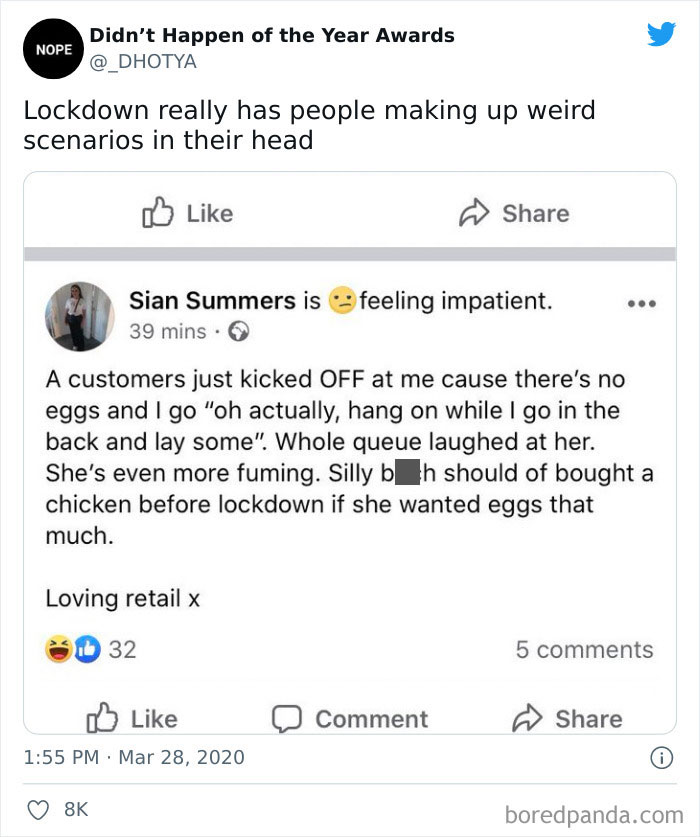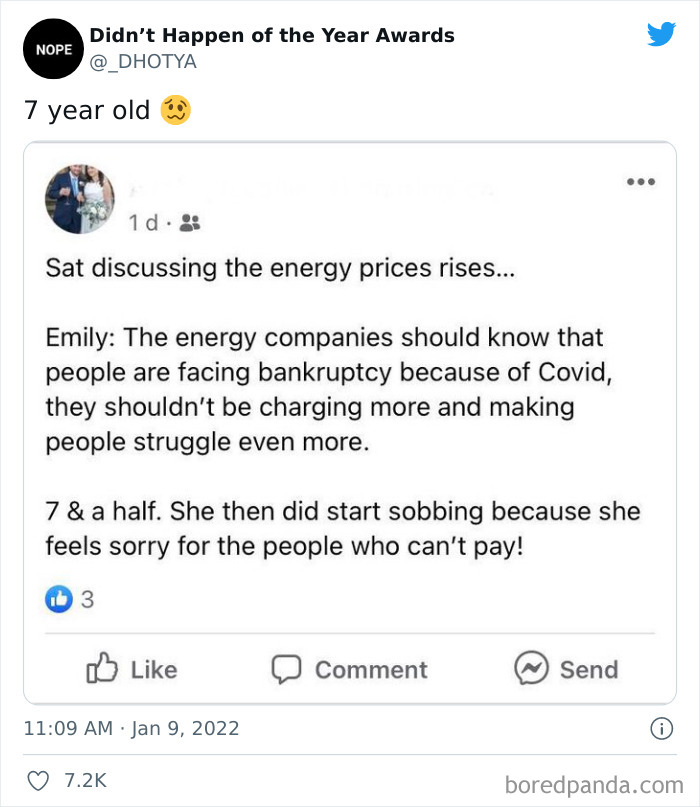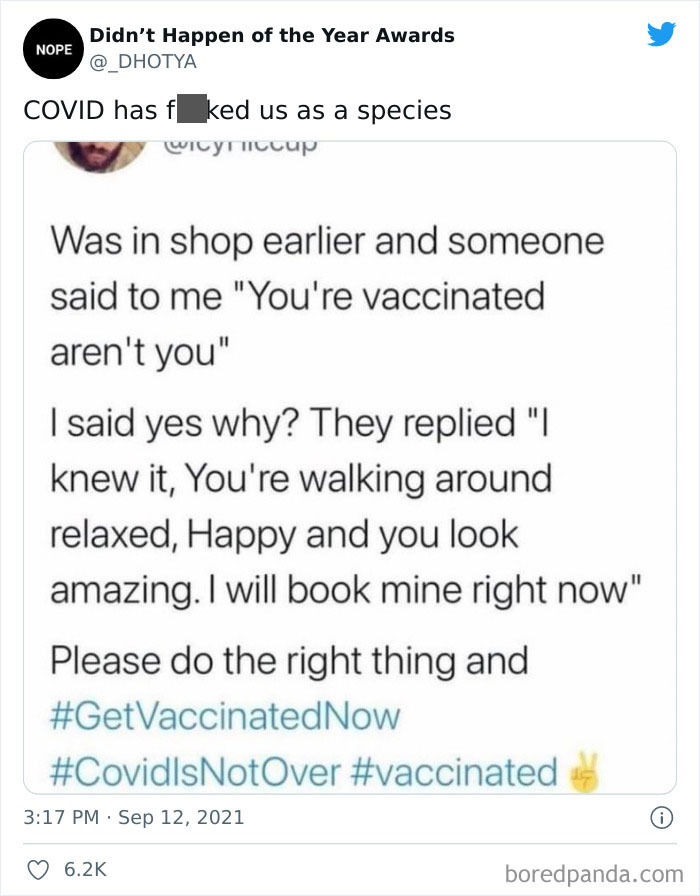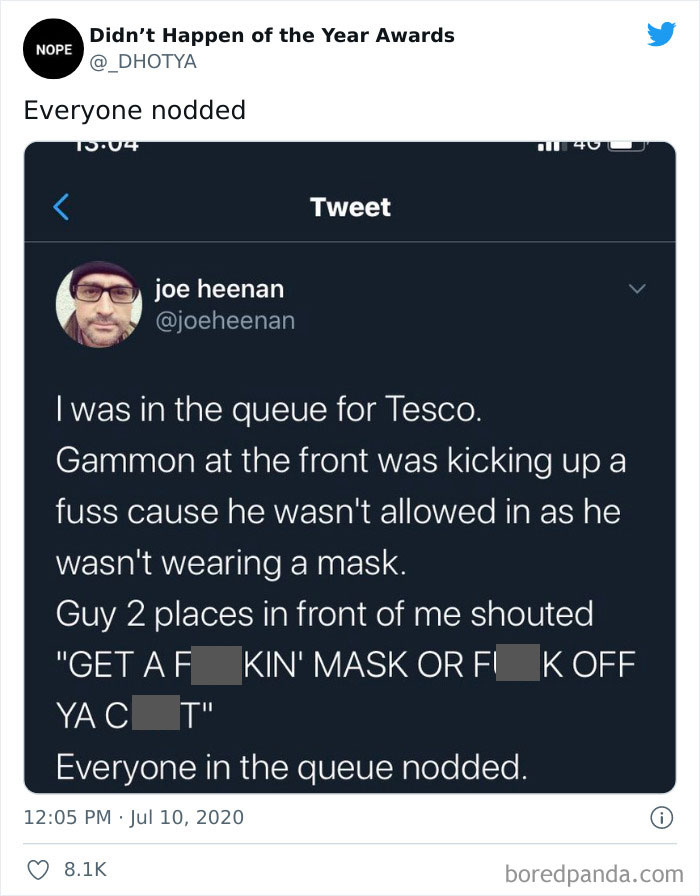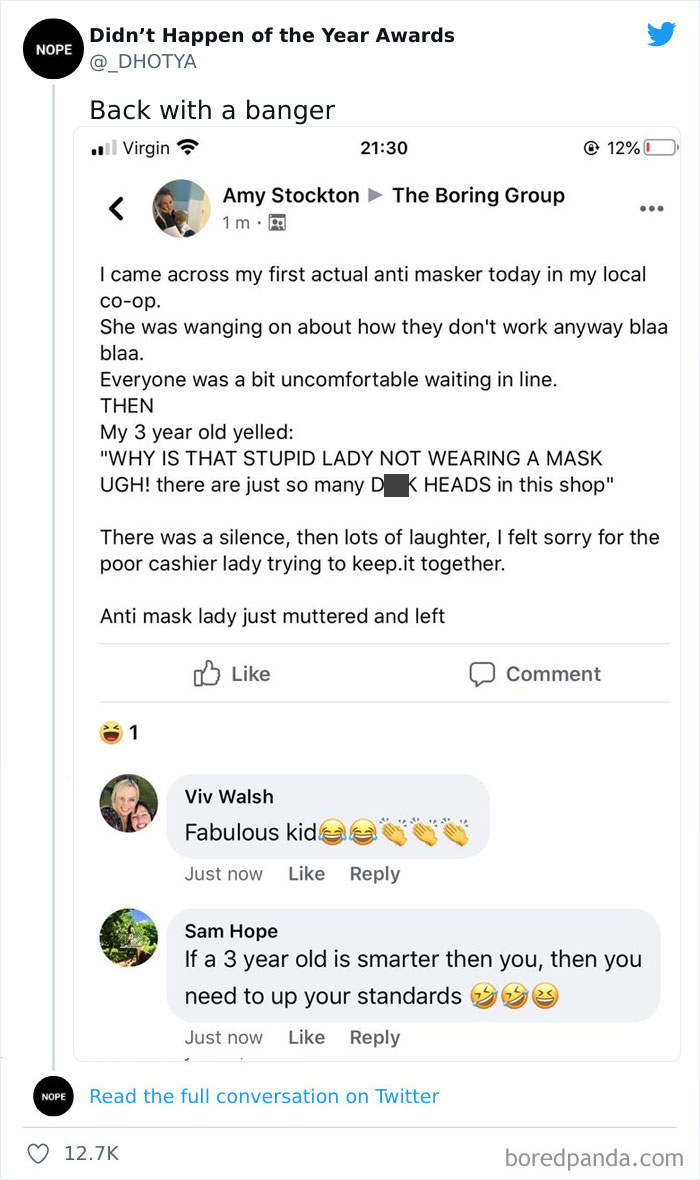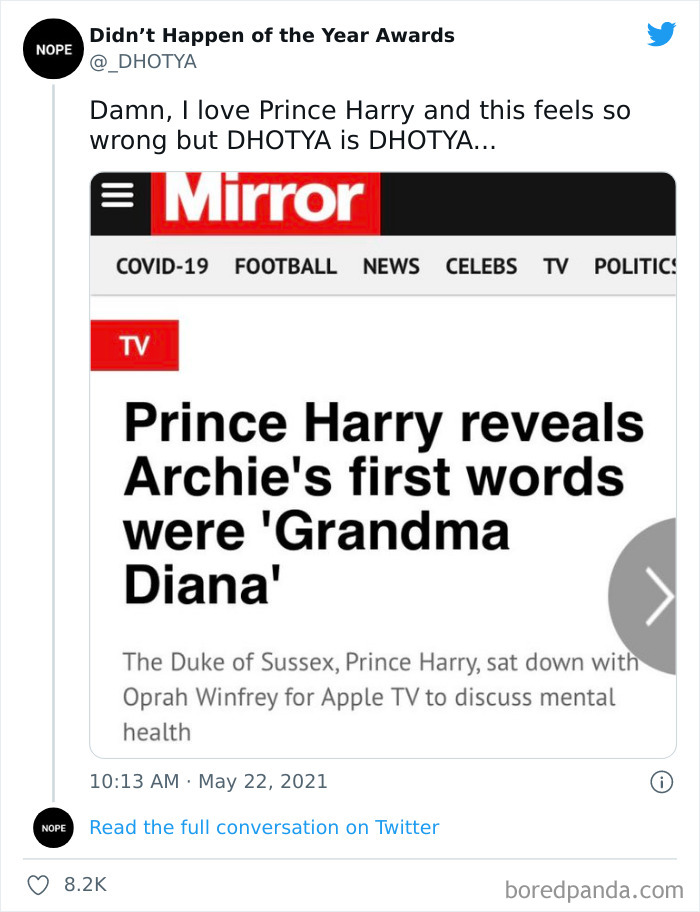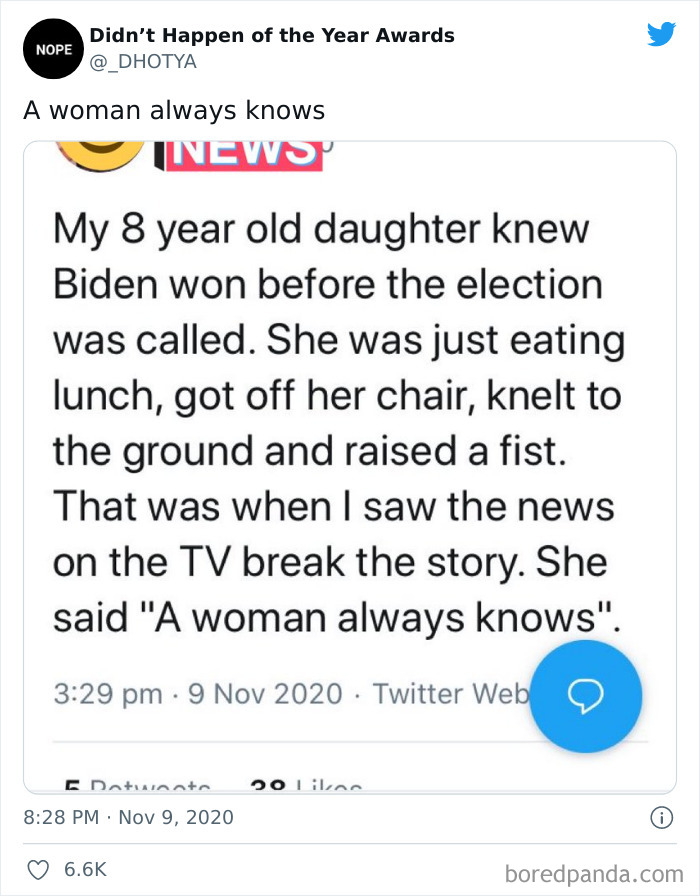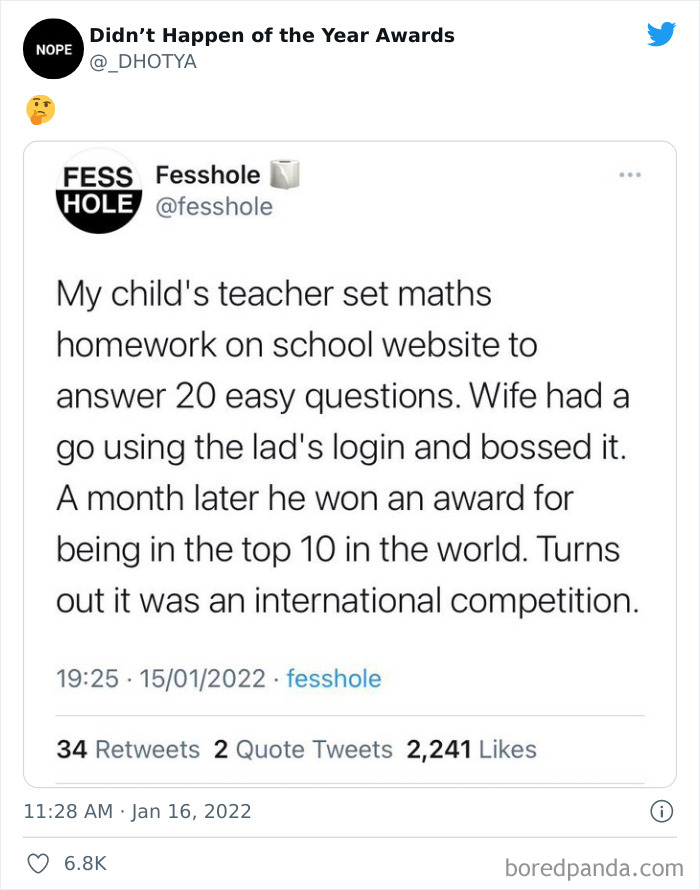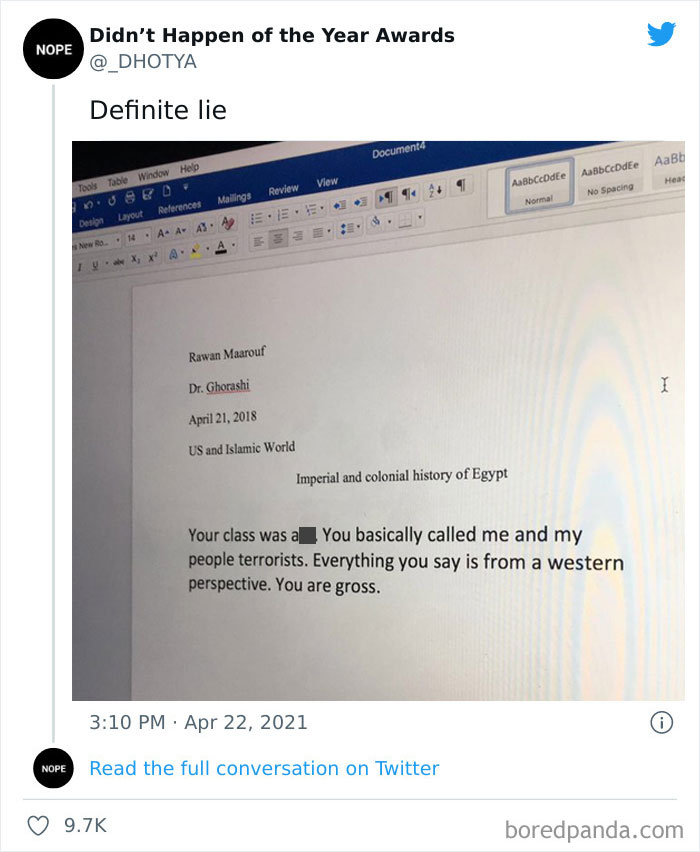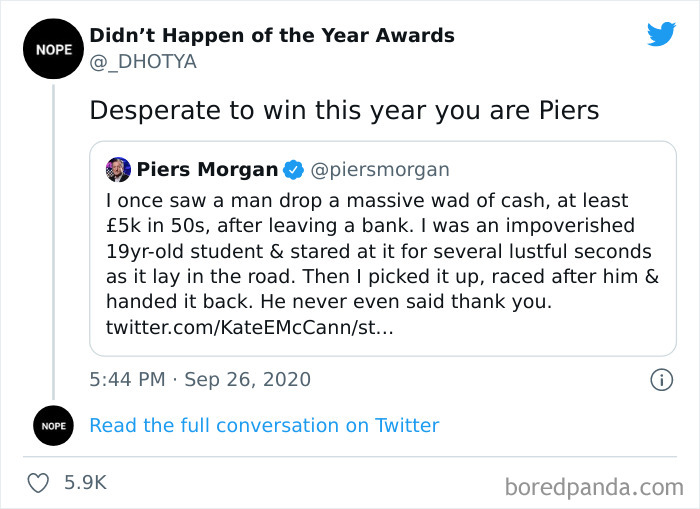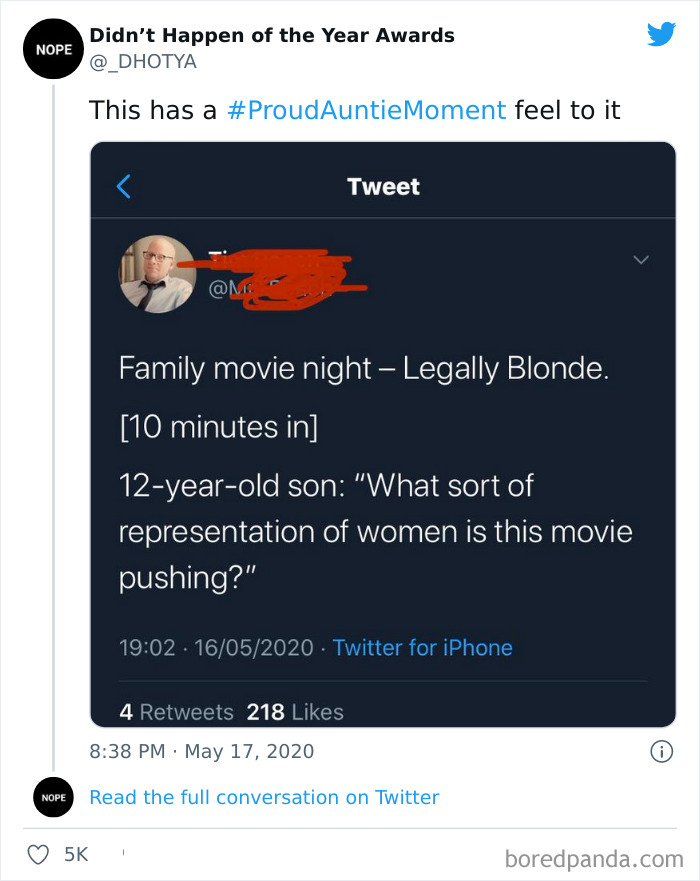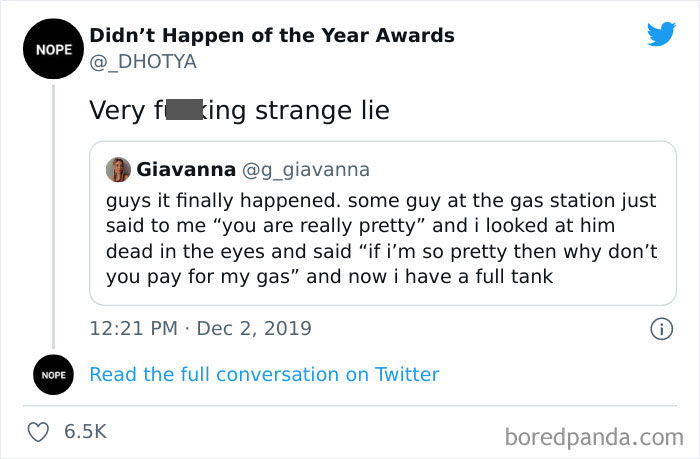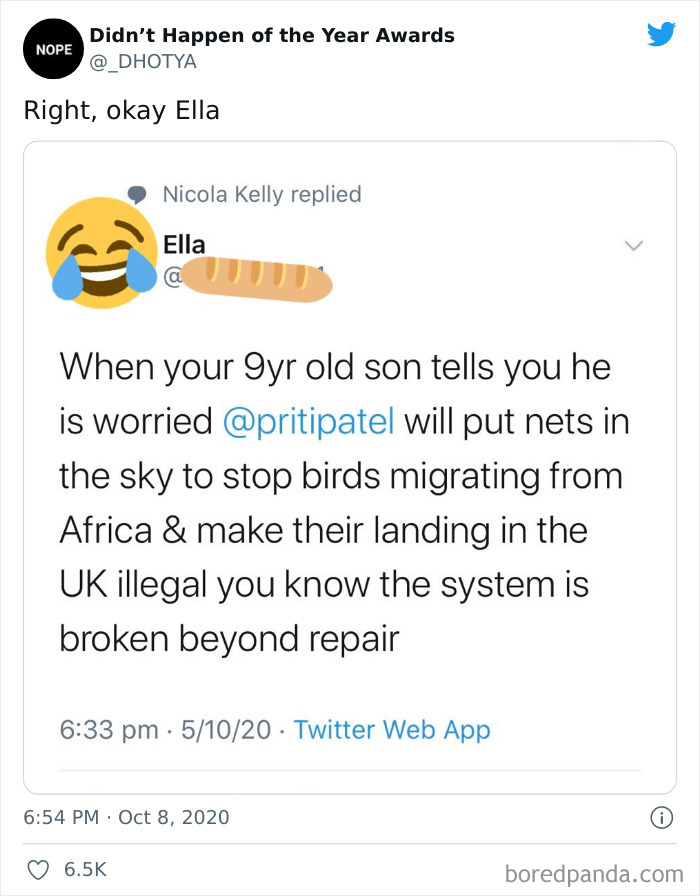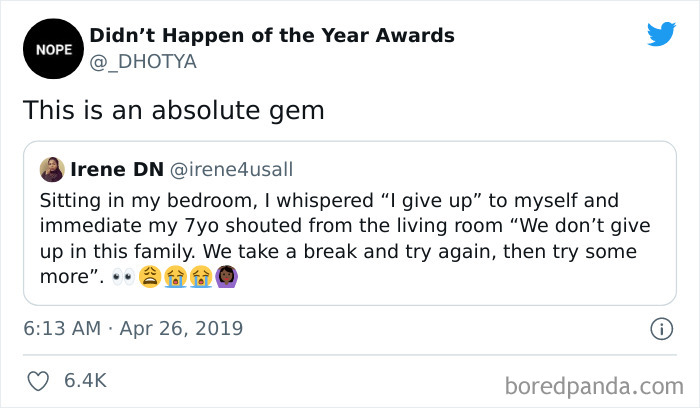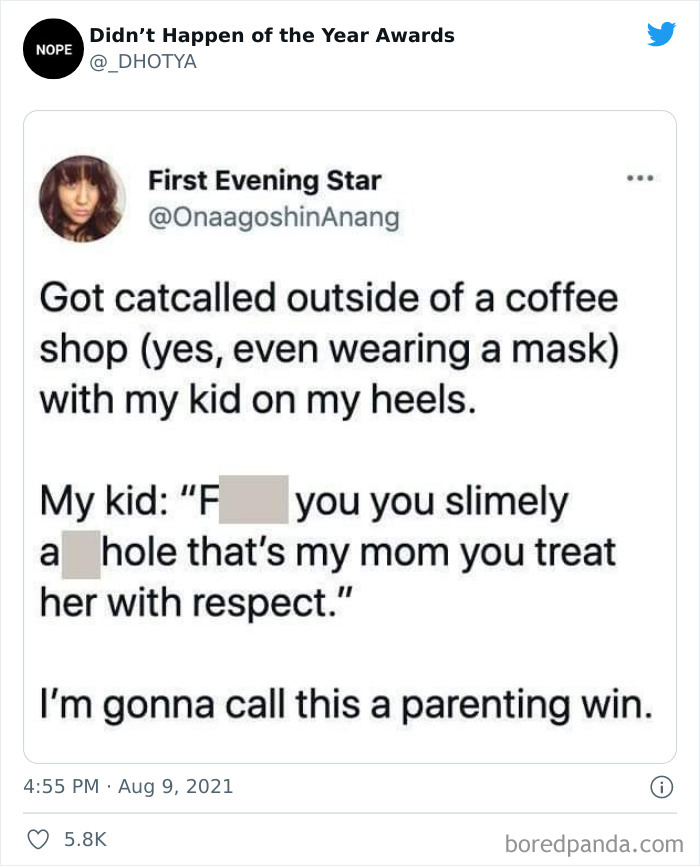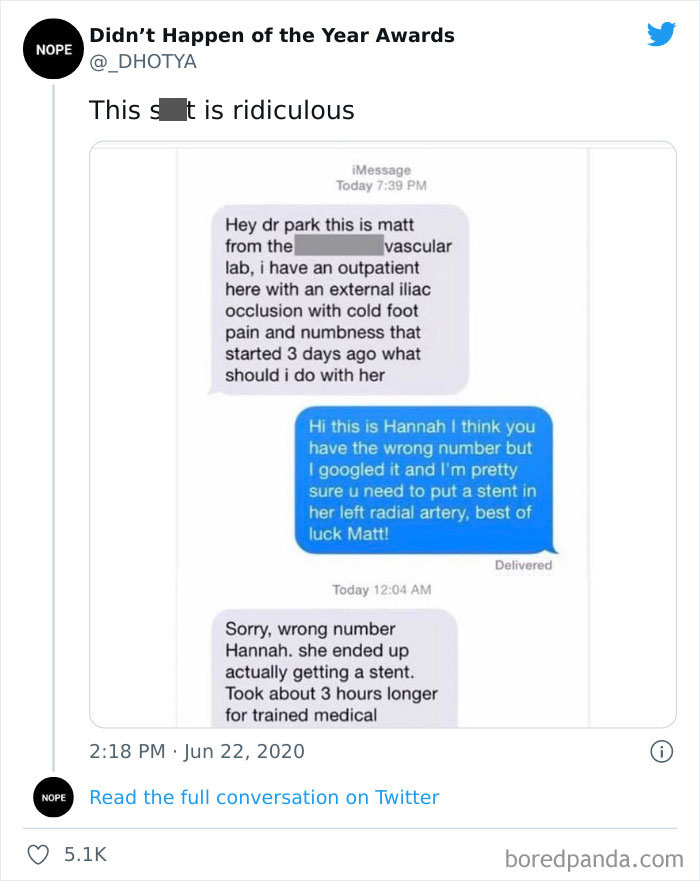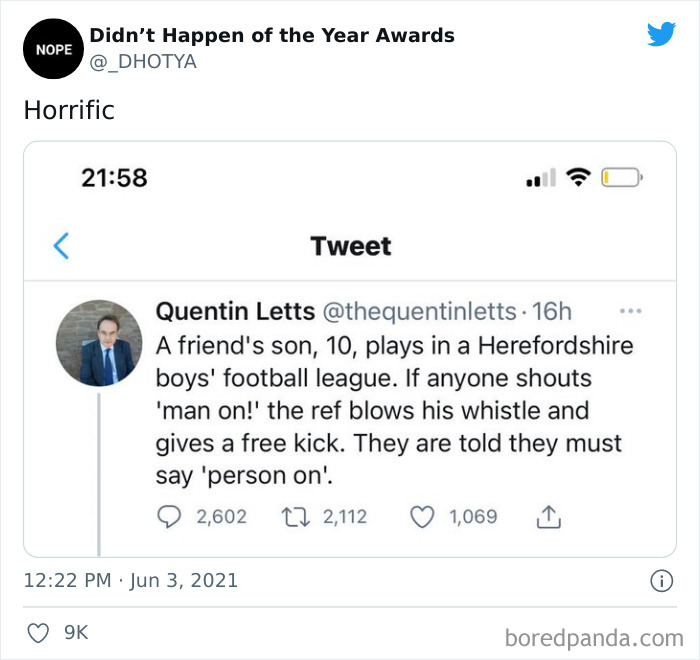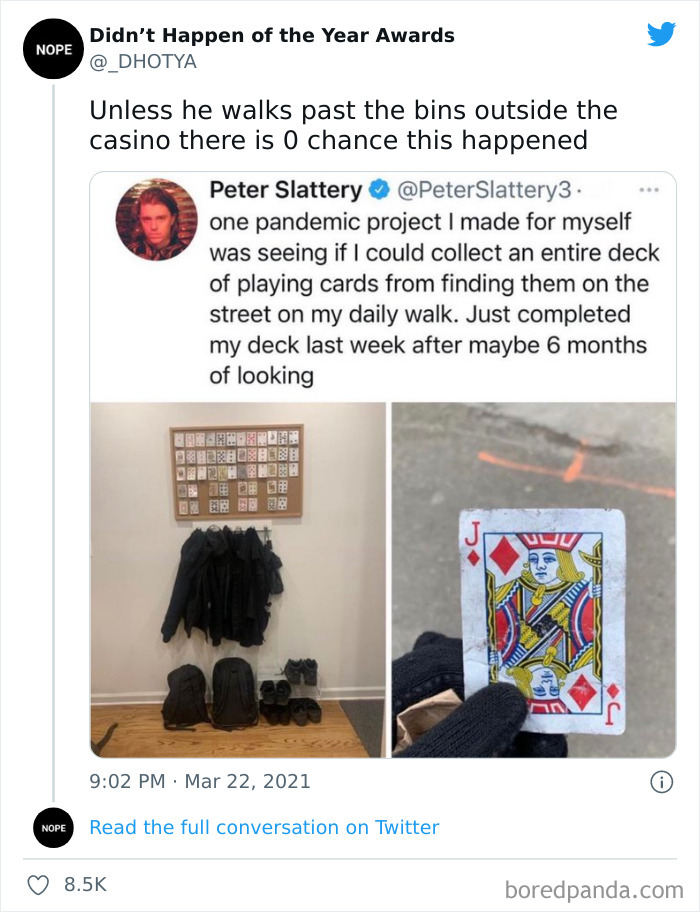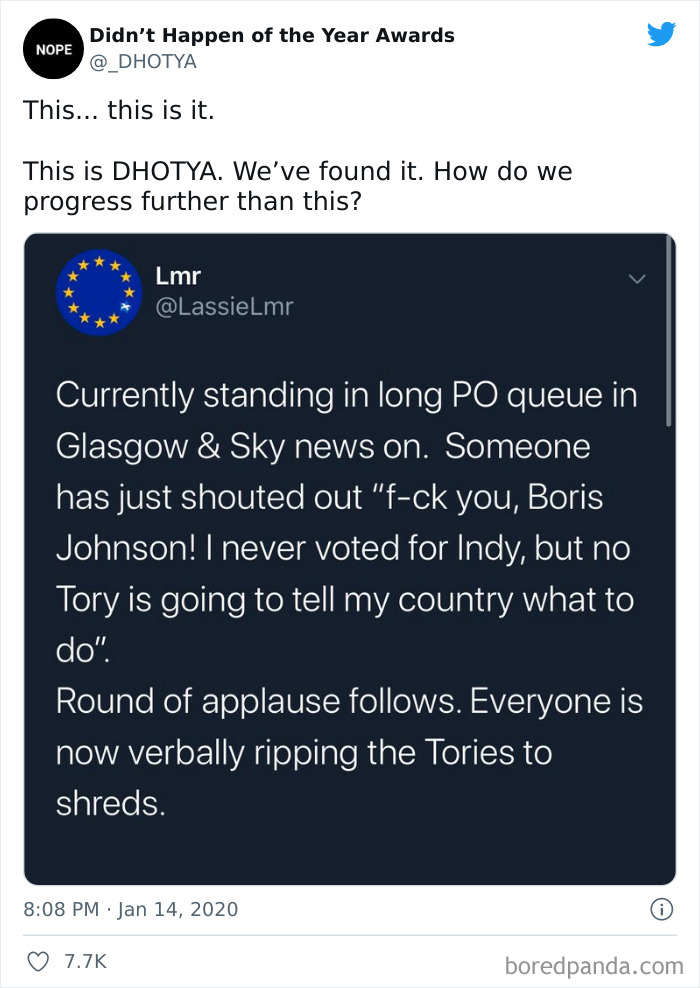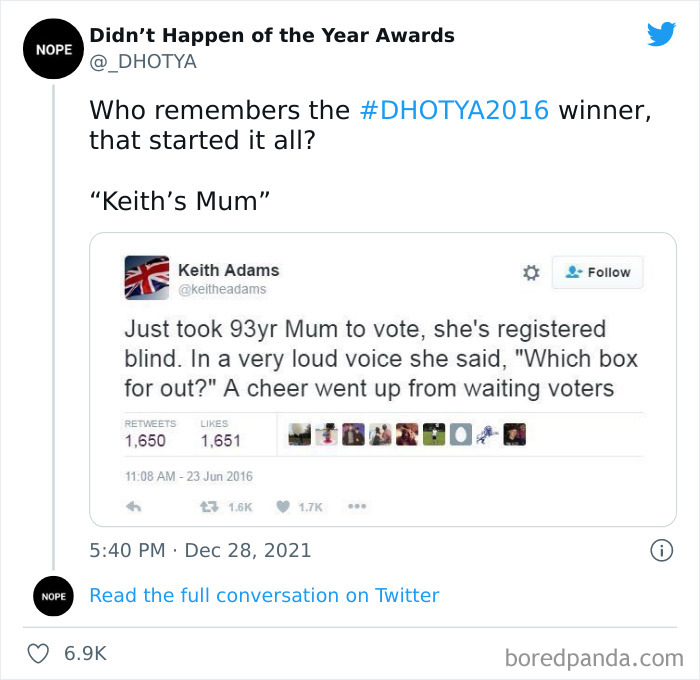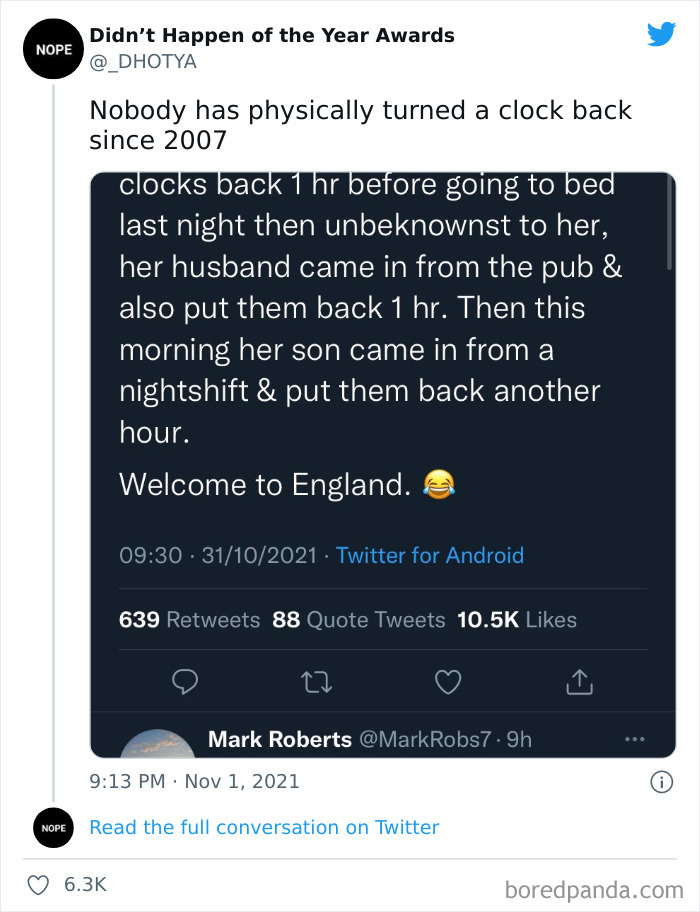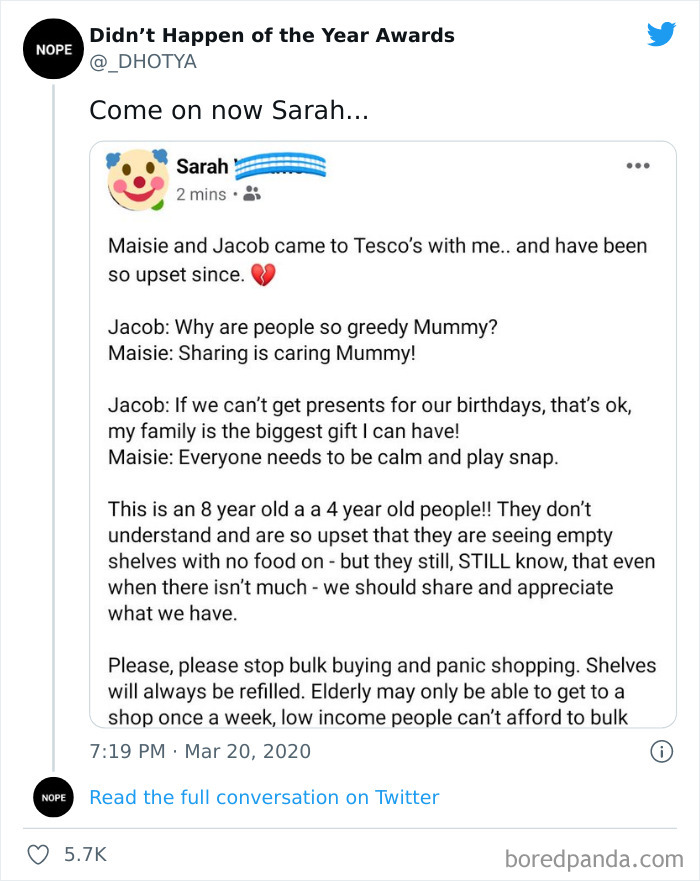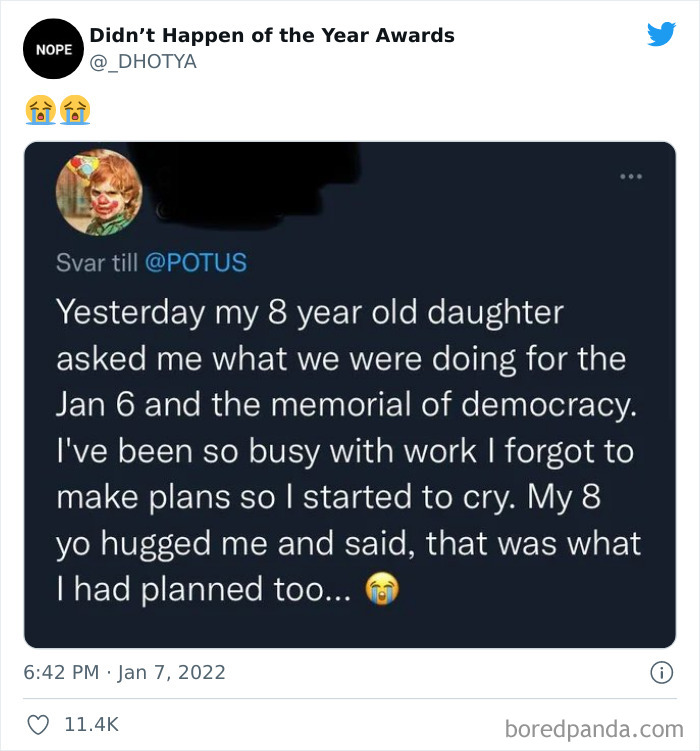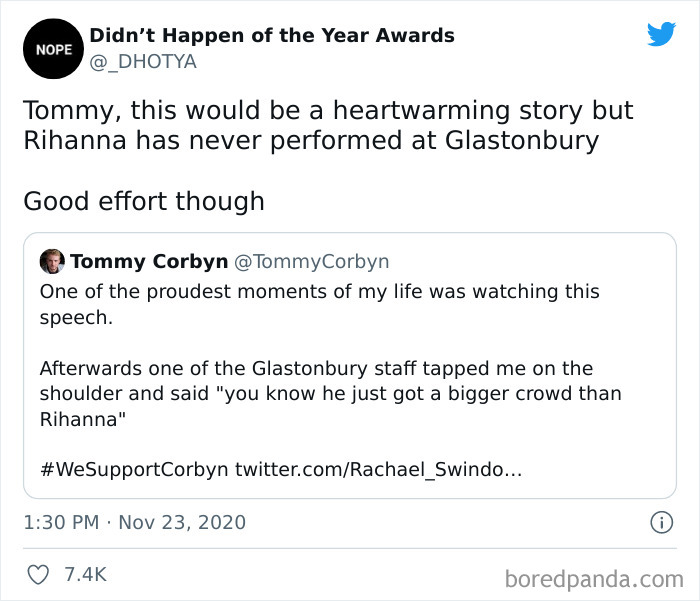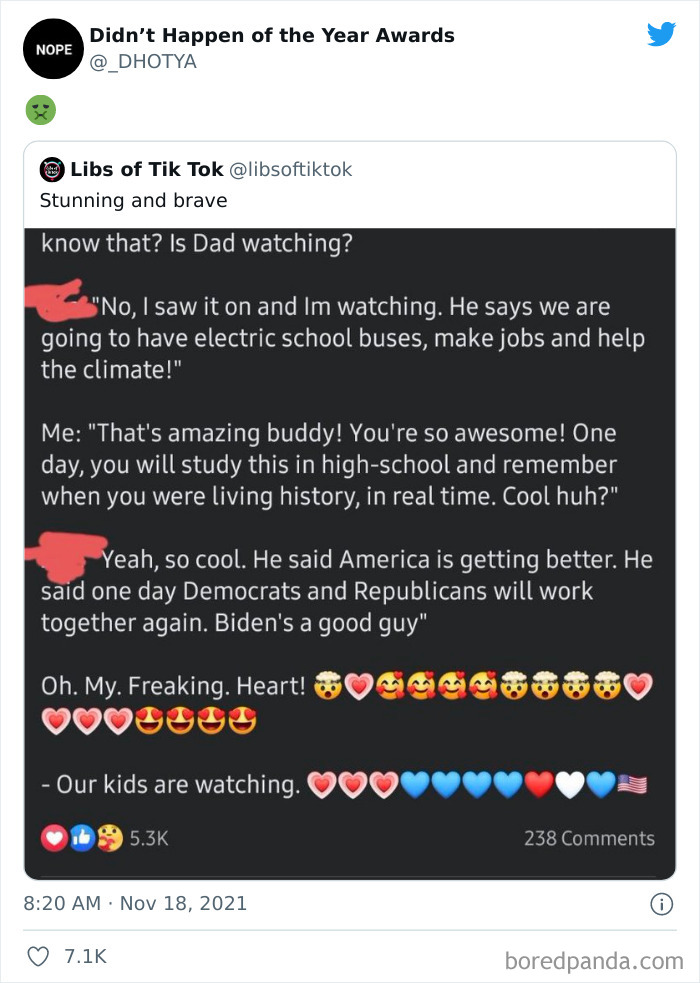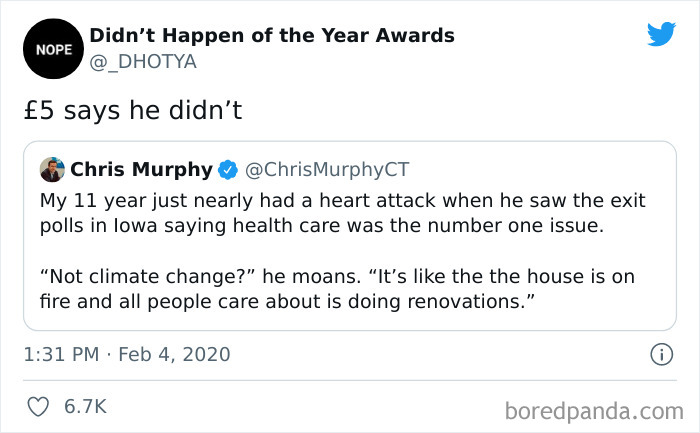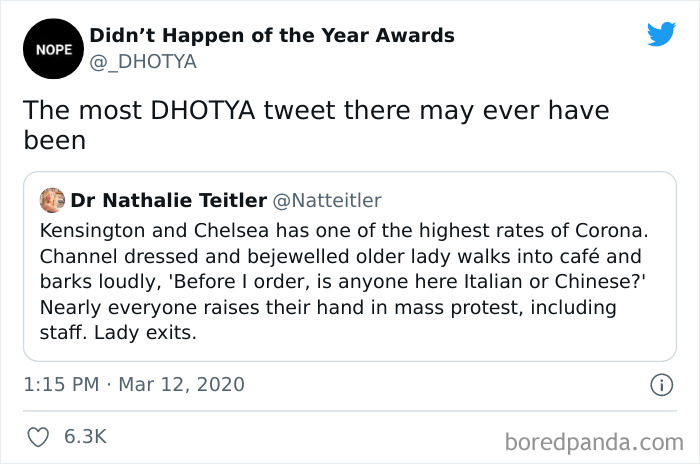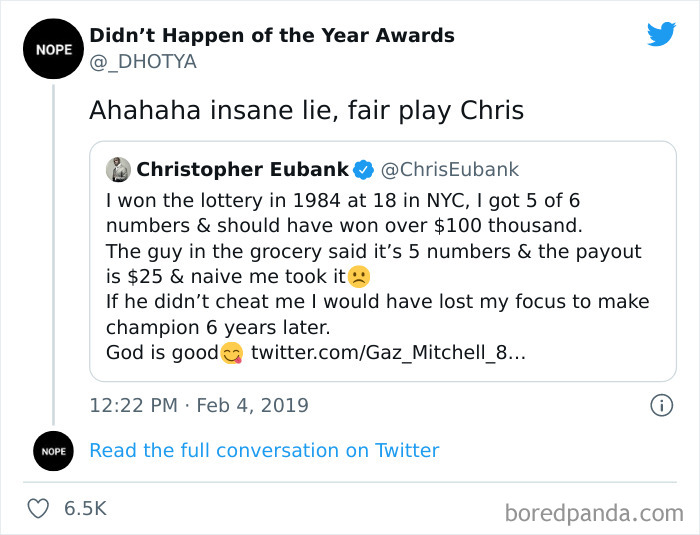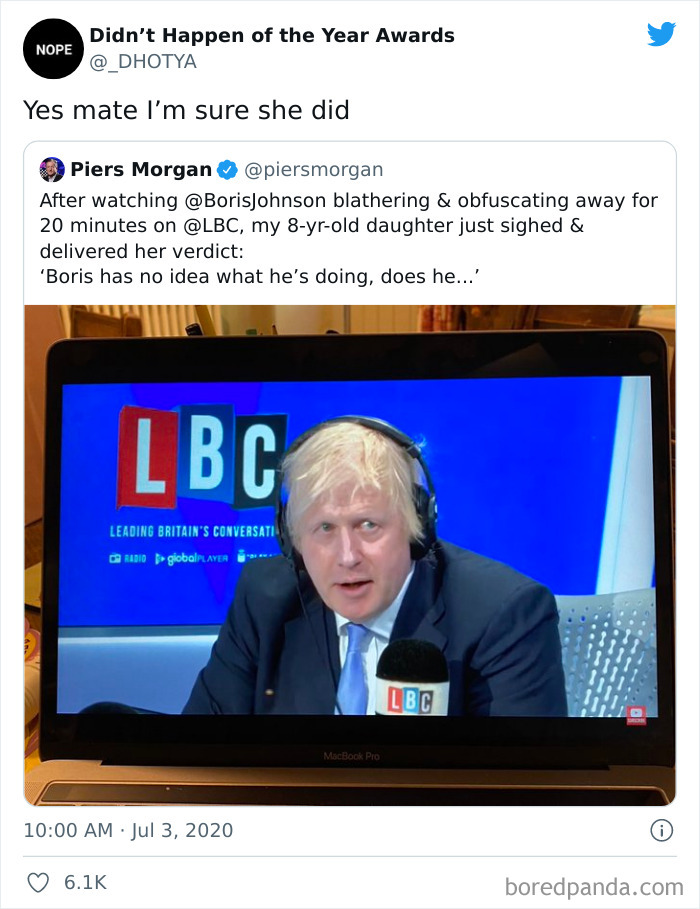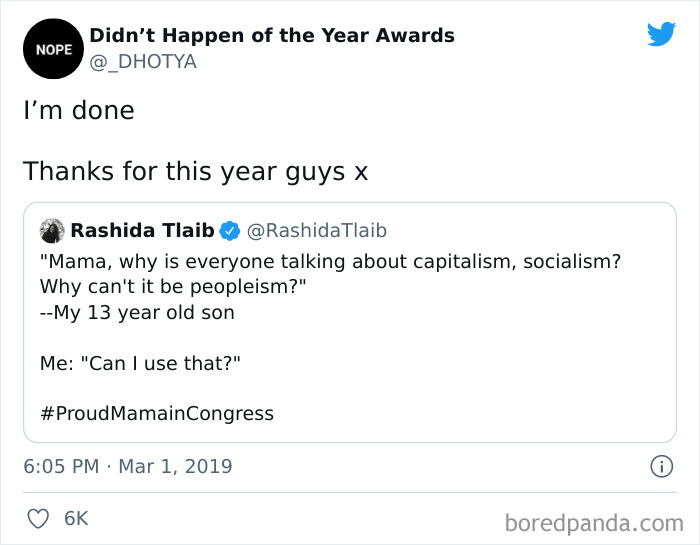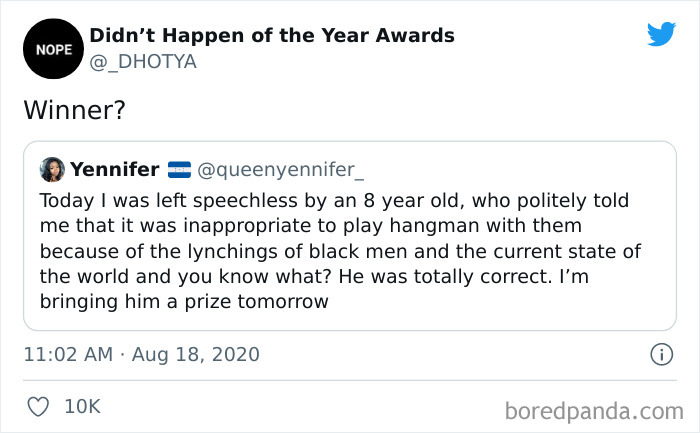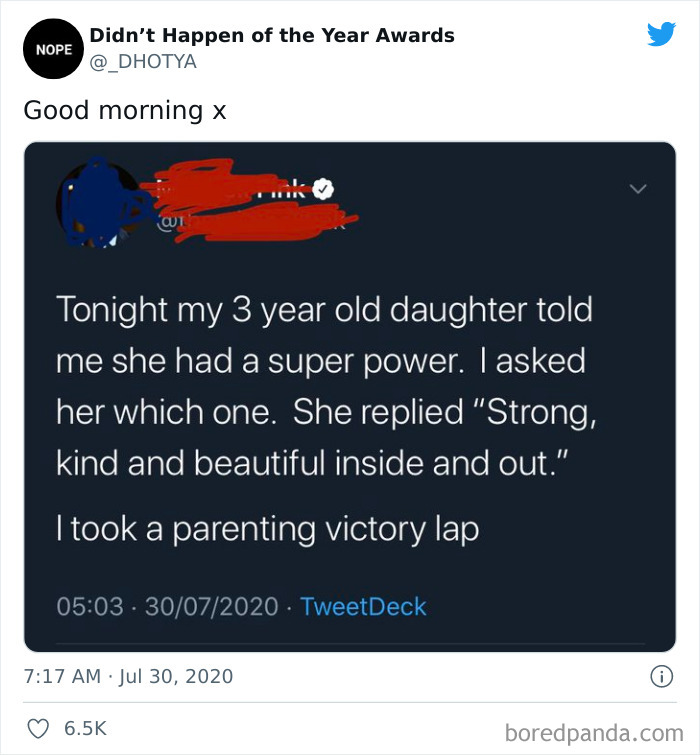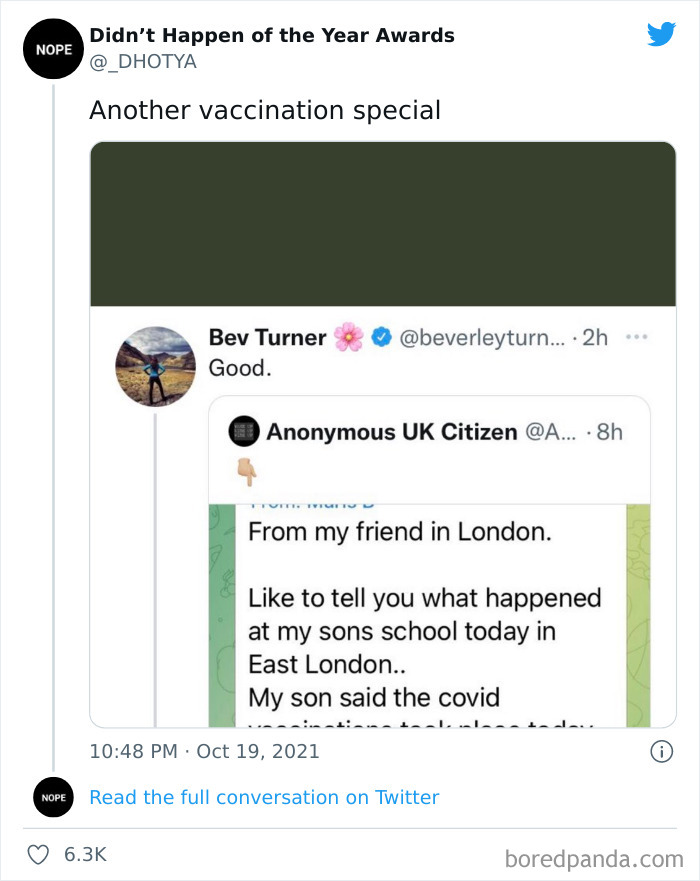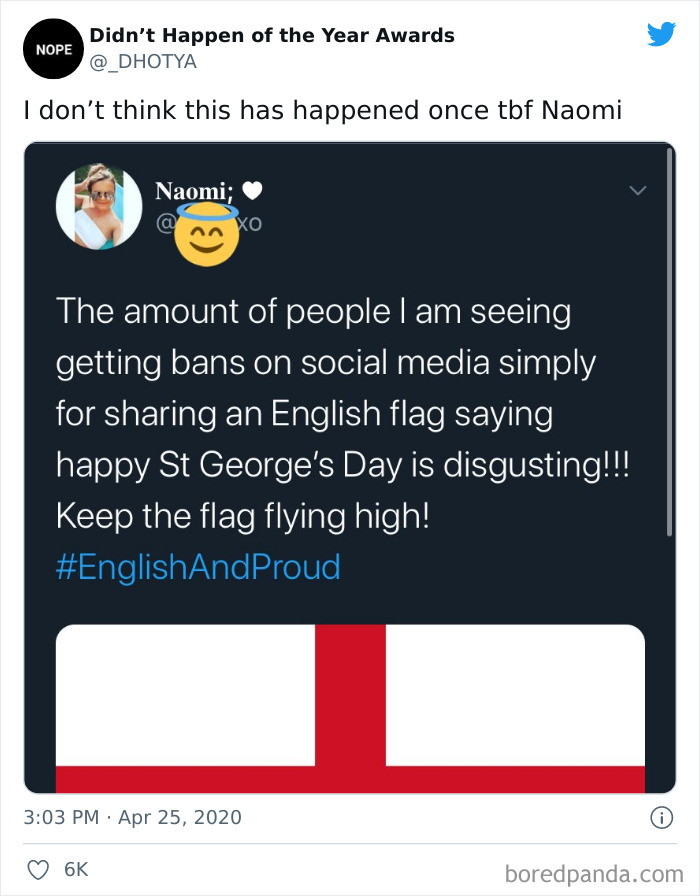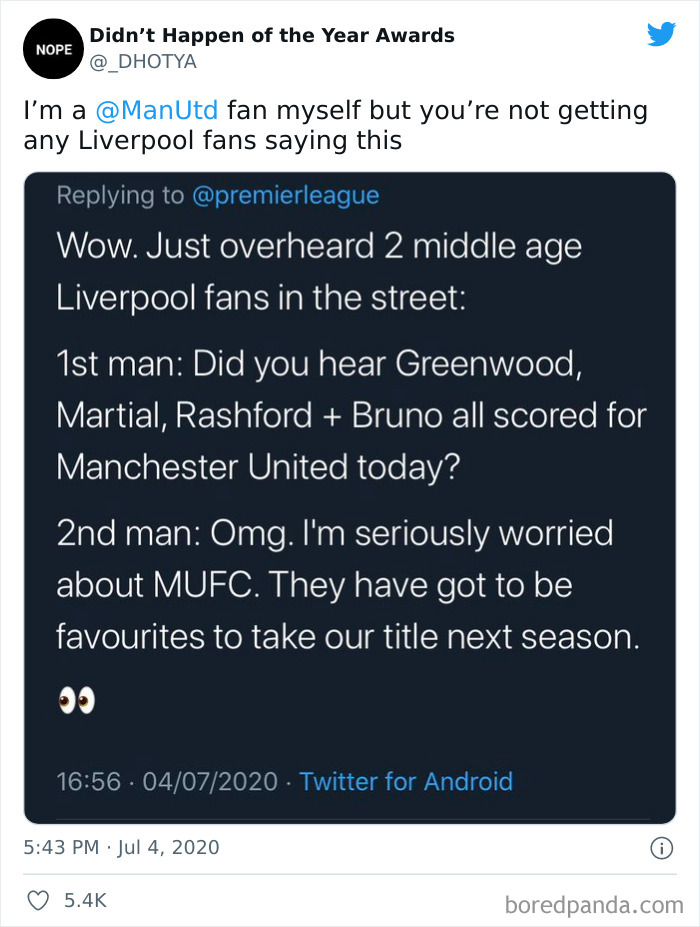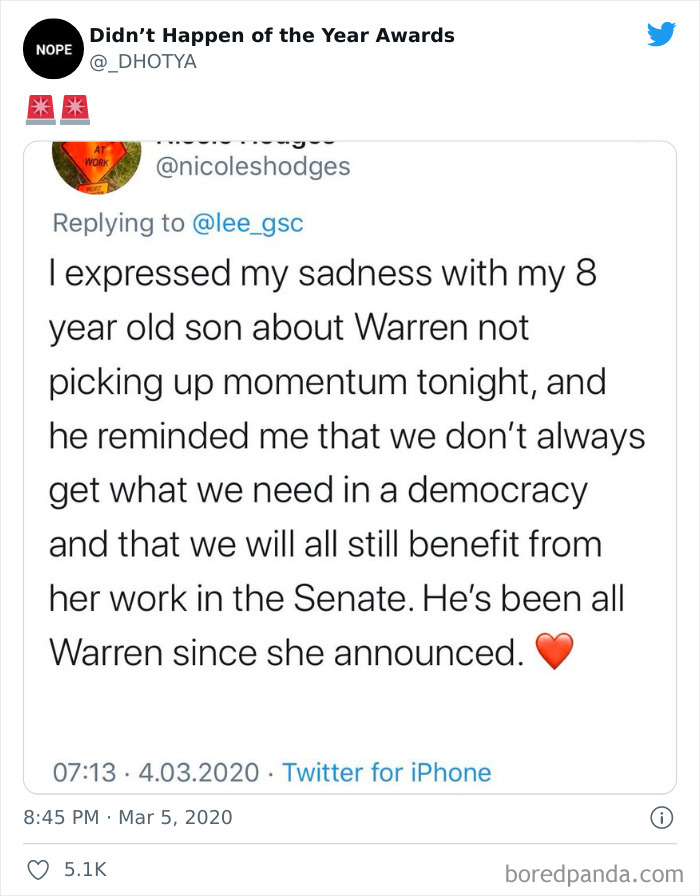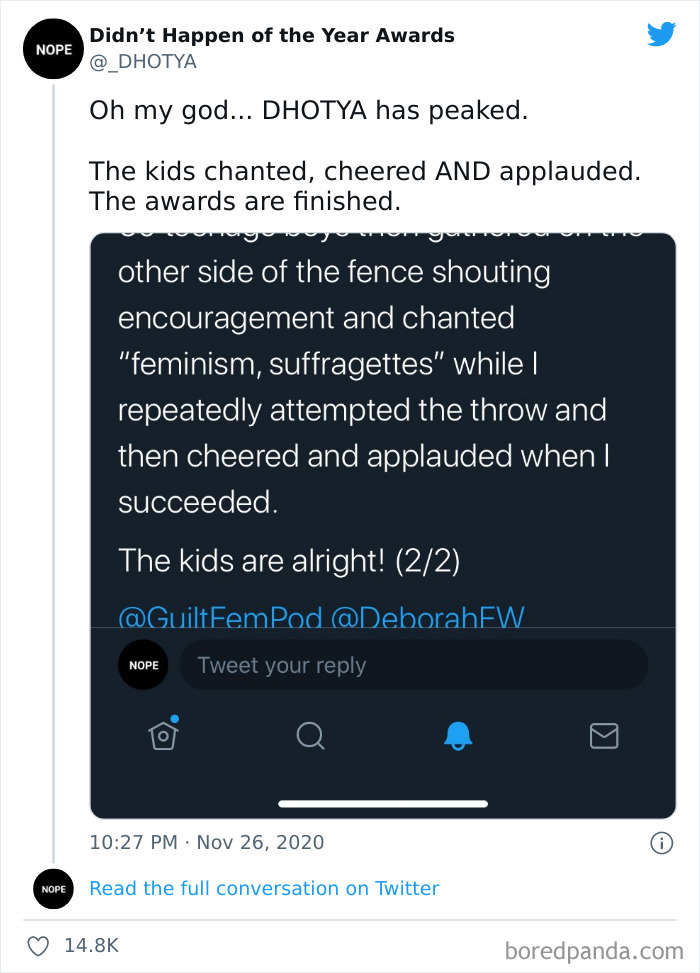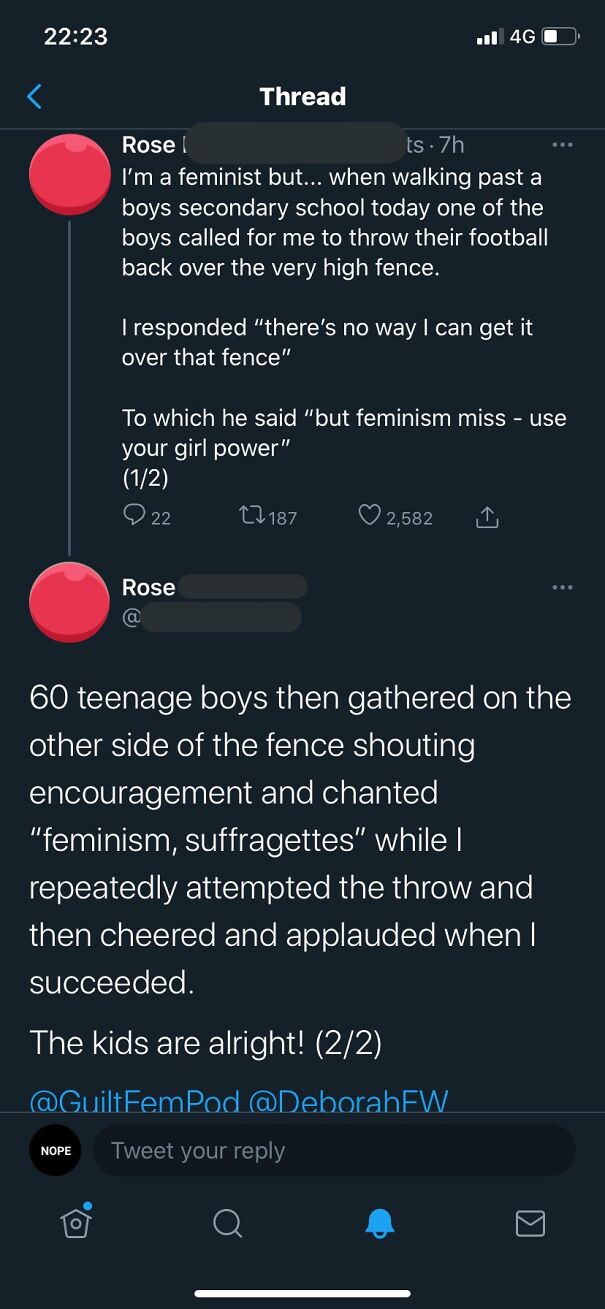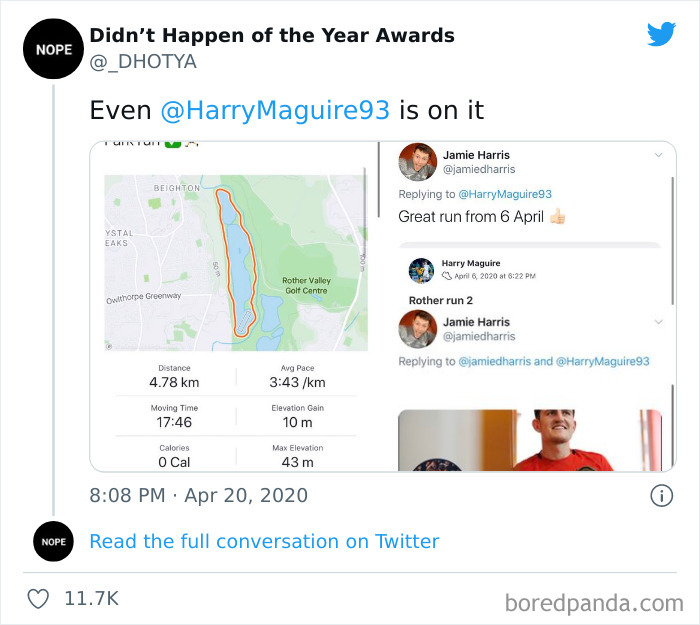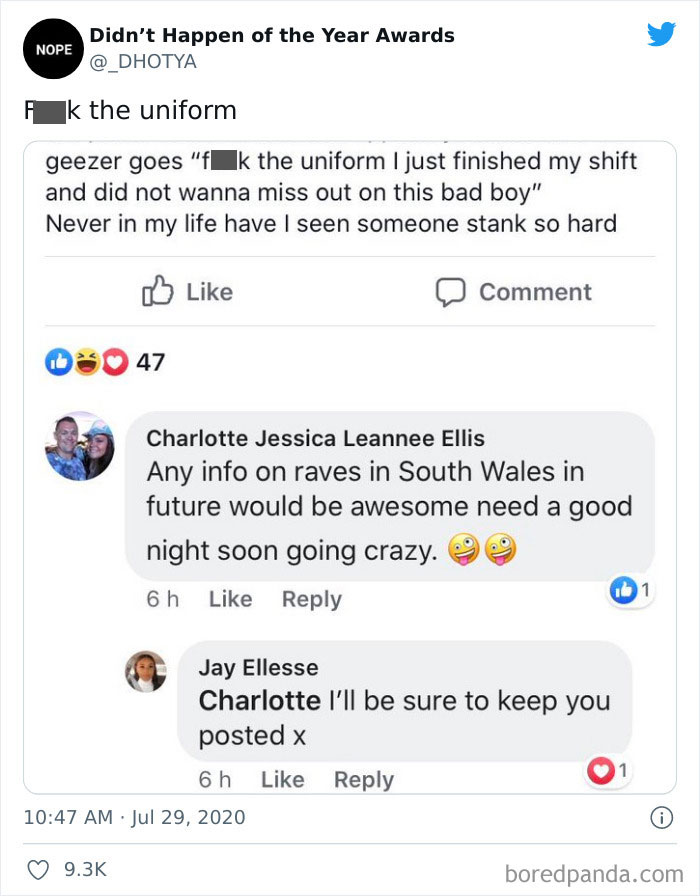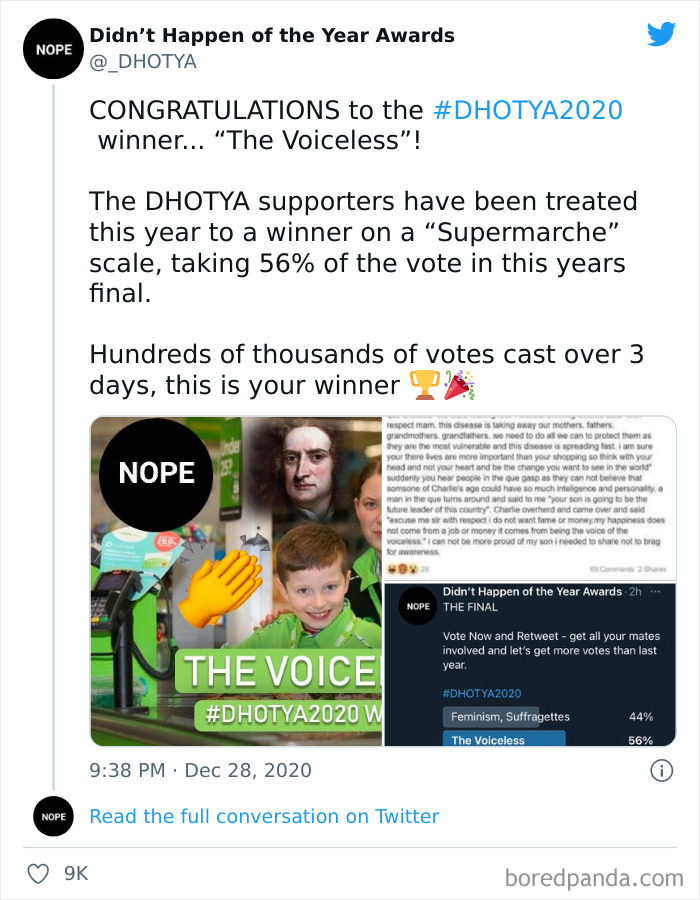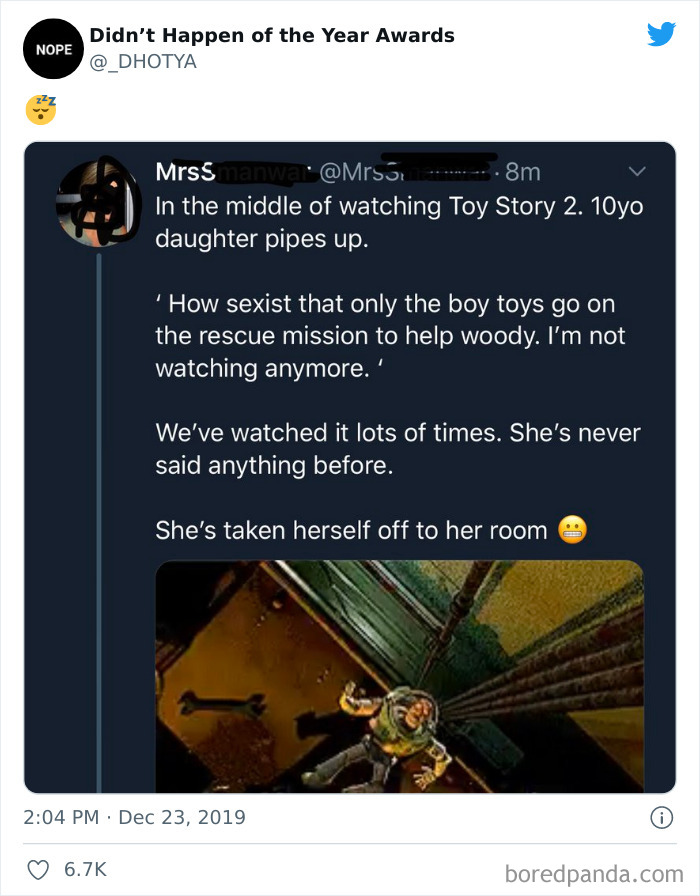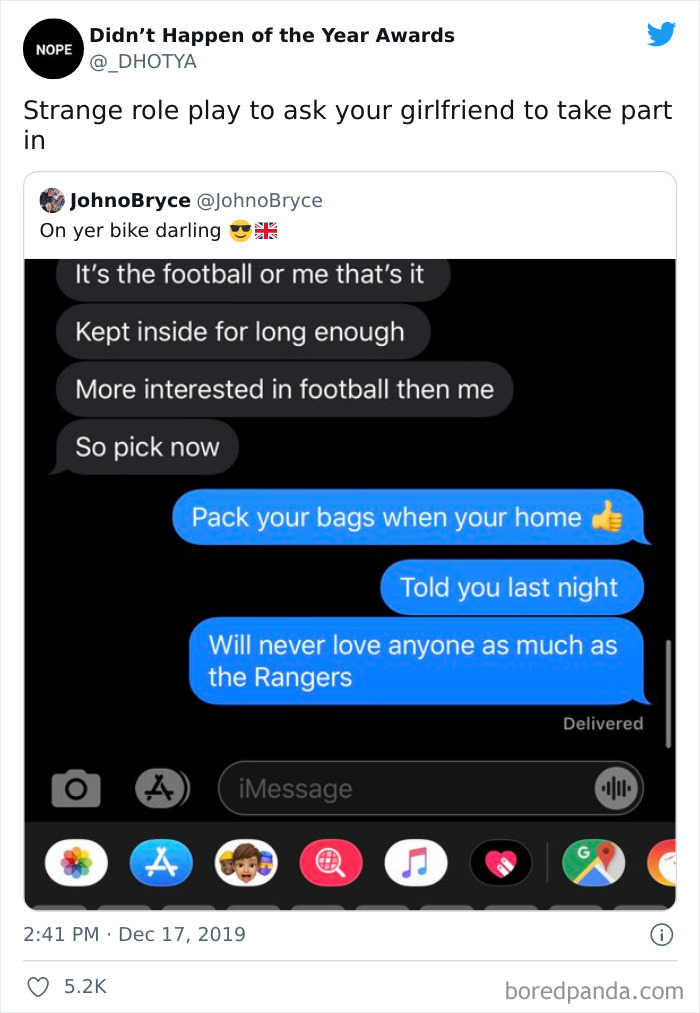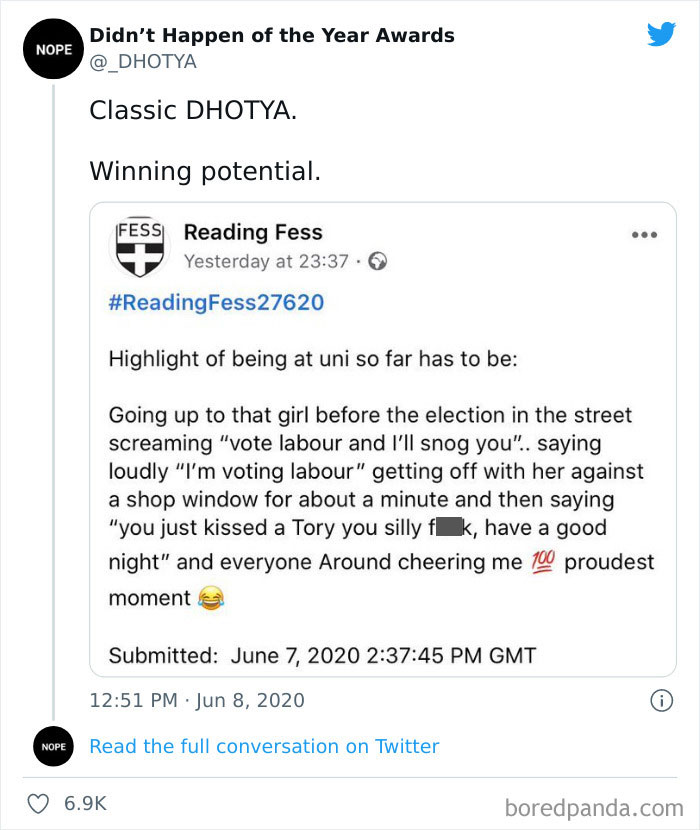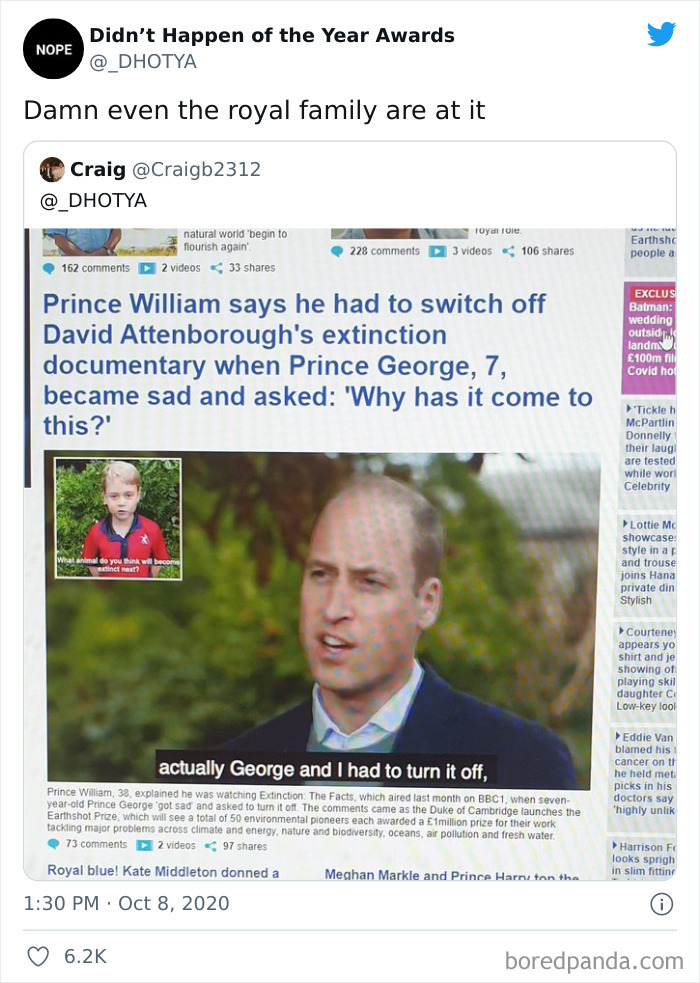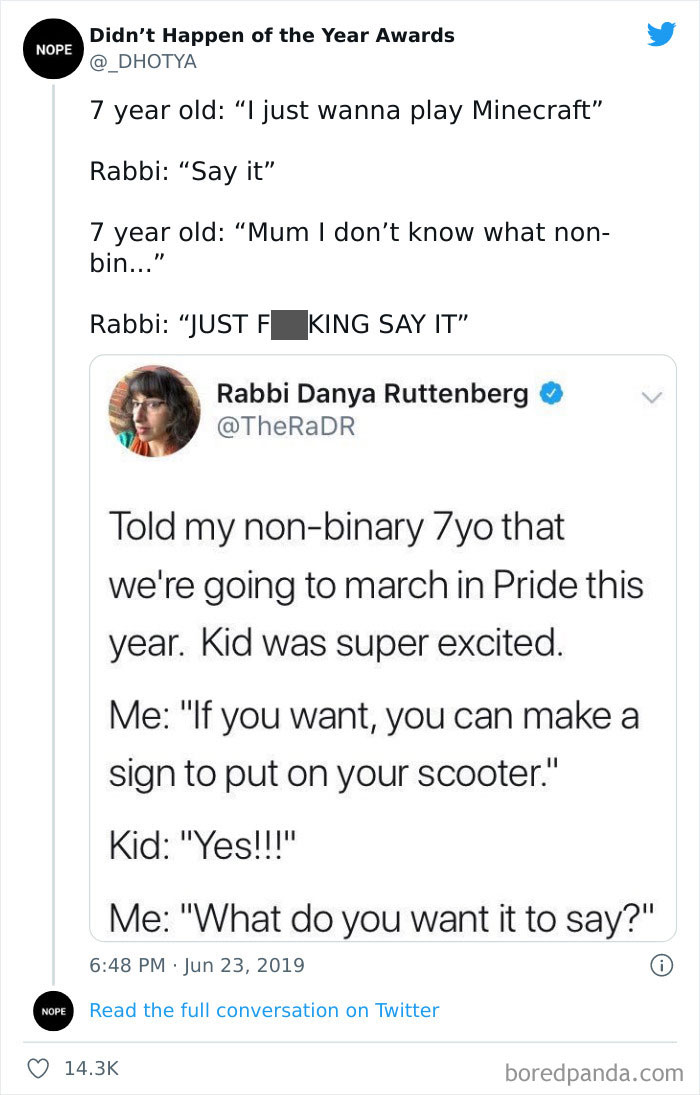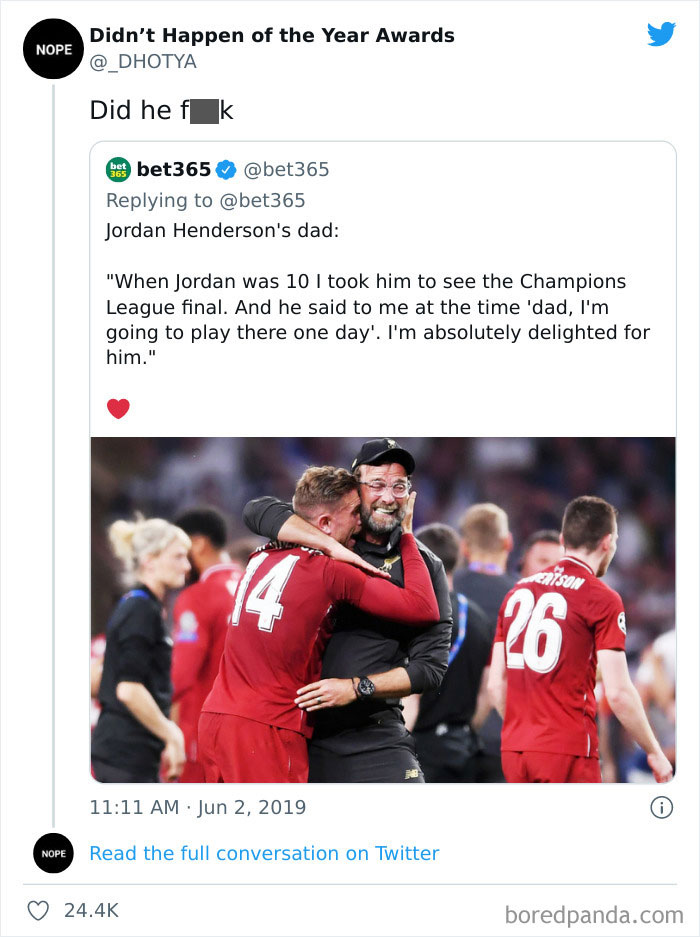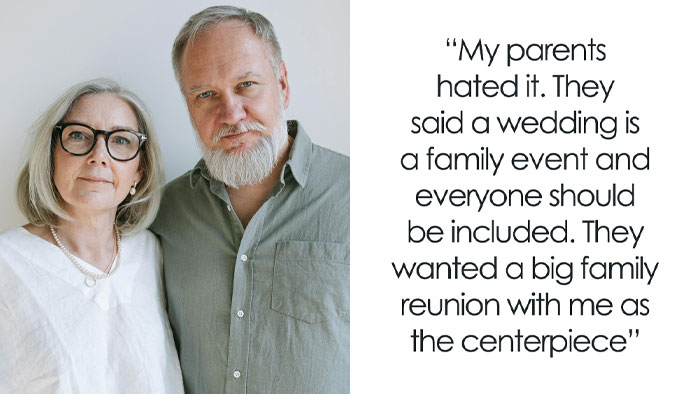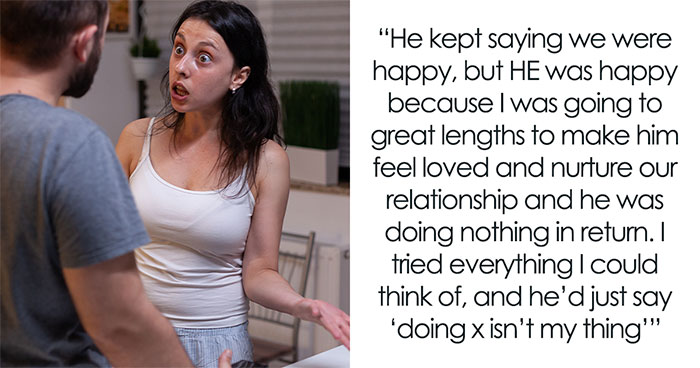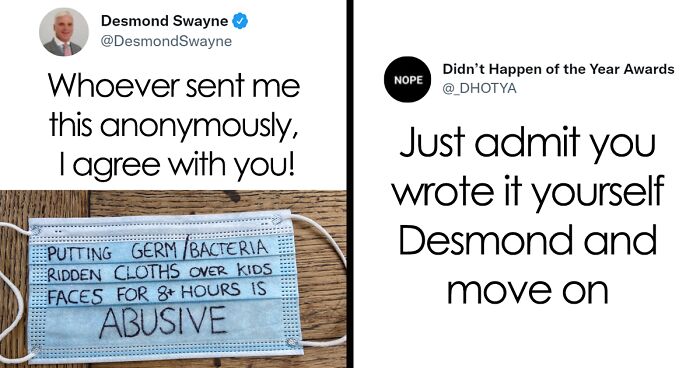
30 Times People Thought They Could Trick Everyone But Got Nominated For “Didn’t Happen Of The Year Awards” Instead
InterviewLet’s face it—people lie. Sometimes, they’re able to get away with it quite easily, too. But when they start spreading exaggerated stories on social media, the truth eventually comes out. After all, there’s always someone ready to call them out on their BS.
Enter the Didn’t Happen to the Year Awards (DHOTYA), a Twitter account that exposes and shames the most conspicuous lies shared on the internet. Each year, the most unbelievable tall tales are picked out and pitted against each other, with their 339K followers voting for the biggest liars on social media.
From kids having intellectual moments on politics to people receiving a standing ovation after announcing their opinion, we have collected some of the best posts this account has to offer. Continue scrolling, upvote the finest “didn’t happen” incidents, and share your thoughts in the comments below!
This post may include affiliate links.
This isn’t about ego, this is about trying to shill her MLM oil blend crap.
Load More Replies...Regardless of what you believe. Do not let random strangers in parks inject you, unless it is your own epi pen.
You know what I hate about posts like this (I'm talking in general when I see these types of posts- not just this one particularly)? Why are we hiding their names? Please stop protecting the stupid. It's not like they didn't post this on social media themselves so ...no need to protect them. Let their freak flag fly proudly and let them get all the s**t they deserve in comments. It's the only way this type of crap is ever going to stop-- call them out on it.
Reminds me to put a pair of boxing gloves into my backpack for situations like this (it happens more often than you think 😂)
Or the pepper spray in my backpack for situations like this (it happens more often than you think 😂)
Load More Replies...If it was true, this story is basically. Moron thought they could get an allergy from passive eating, was assaulted by someone with a needle, and had a bad trip.
I know this is all B.S., but who INJECTS oil? WT actual F? Using it to make things not smell like onion farts and nasty,yeah...but injecting it. Is that really a thing somewhere?
Injection of any kind of oil kills you. In the blood you're dead on the spot, in a muscle will take a few days of agonising pain.
Load More Replies...When you want everyone to know that you're an incel without saying that you're an incel.
All you gotta say is "wifing". That's a noun that should not have been verbified.
Load More Replies...But this is 100% true, this is how biology works. On holidays I always stare at beautiful lush green landscapes, so much that over the years my eyes turned green. Honest, guv.
The baby also pobably came out with a stack of photos of their mother's previous partners, so that everybody could compare them and make sure that the baby indeed looks like those 15 guys. Not 5, not 12, not 17, exactly 15.
gonna be hard to identify them by just their d**k pics lol
Load More Replies...The fact this comment was liked 687 times is the most disturbing part. How can someone type this, read it back to themselves, and then think, 'yes this is sound. This seems like exactly how it works in those crazy women's bodies.'
Say "here" if you read that as WiFing as in wireless internet thingy at first glace.
Bored Panda reached out to Andrew Selepak, Ph.D., a program coordinator of Master’s in Social Media and a lecturer at the University of Florida, to learn more about why people tell such far-fetched stories online. “Most individuals, brands, and influencers don’t really lie on social media, but they tend to exaggerate,” he told us.
“Everyone engages in self-image manipulation on social media. We highlight and promote our best moments while leaving out the bad or mundane,” Selepak added. “But for the individual user, scrolling through their timeline, it appears that everyone is always doing something exciting whether it is [going] on vacation, getting engaged, or having a child.”
Selepak explained that social media allows more people to see the lies and exaggerations others post. “Before social media, a person could tell a lie to another and then the exact opposite lie to someone else, and it is possible no one would know. But you cannot do this on social media because everyone you know finds out at once.”
“If anything, social media may actually limit the amount of outright lying people do anymore because anything they say or post can be refuted by any and all of their followers rather than by one person,” the lecturer said. “Instead, we may perceive people are lying more, not because more lying is occurring on social media, but because we can monitor potential lies from hundreds if not thousands of people at once.”
I squeezed her hand and the heavens opened and a unicorn farted glitter and we held hands while walking to the rainbow on the horizon ...
I love when I’m at the dentist and someone puts their unmasked face right next to my mouth. Especially since dental professionals always wear masks when they’re doing dental work regardless of covid!
Also, not to mention the paperwork, where she would have listed vaxx status...is done in the front office before the service is performed. The hygienist would not have seen that answer, since the form would not be filled out in the freaking dental chair. SMH
Load More Replies...Probably got Covid and its an effect over their fevered brain.
Load More Replies...So Daniel's fantasy is finding health workers that are as selfish as him. Life goals.
I like how these people think their cause, idea, etc. is so righteous and true and yet have to contsantly like and makes stuff up to prove it so.
So full of s**t, that it actually comes out of his mouth and his posts!
Load More Replies...Very trumpian. 'Your eyes and ears are lying to you; listen only to meeeeee!'
Load More Replies...He noted that the great thing about having the internet in our hands is that collectively, we can expose lies and those who spread them more than ever before. When it comes to spotting these dishonest posts, Selepak mentioned there are two different types: lies and exaggerations.
When it comes to the latter one, most of us tend to blow up the facts on social media: “We post about a meal at a restaurant to show people we are out and take pictures of the food framing it in such a way to make it look more appetizing, or a photo of the restaurant itself to make it look fancier than it is.”
“We could also post to social media about a job promotion and how excited we are while leaving out that we will be working longer hours and have to spend more time away from friends and family,” he continued. “Exaggerations on social media, for the most part, are harmless and act as life updates to our friends and followers.”
"cause autism, cancer and increase the risk of homosexuality" oh shut the f**k up
the crap they come out with what's next they can make you grow extra arms
Load More Replies...I feel cheated. Got both vaccination shots and I'm not even a tiny bit homosexual. False promises.
I already got three and still heterosexual! I've also been cheated :)
Load More Replies...IKR???!!! Like, my RiSk oF HoMoSeCtUaLLiTy didn't happen because of a vaccine, it happened from the first time I saw Zendaya! 😅🏳️🌈
Load More Replies..."increase the risk of homosexuality." If that was true I would be the most lesbian lesbian alive probably. Good lord I hate people.
I got all my vaccines and I'm still not a lesbian. I'm bisexual!
Load More Replies...I like the 'risk of homosexuality' part that was thrown in randomly. Insanity aside, I like that homosexuality is ranked with afflictions like cancer. And why do people constantly have to make their children out to be some kind of bigoted savants? This is not the first time I've seen something like this. It's always some 5 year old reciting poetry and s**t. Your 2 year old is fascinated by his own feet and shiny objects...stop creating some crazy narrative for them defending YOUR choice because you can't get anyone else to, and because they're the only ones you can control.
And the fact that Autism is ranked with cancer… 🤦♀️ see Sia, this is why we need to be responsible as to how we portray autism in media - because of tools like OP.
Load More Replies...While this story, as a whole, is stupid, this part can be true. My daughter is two right now. Children that age are perfectly capable of being proud. They are proud when they accomplish a difficult task like putting on their own socks or when they make something with their own hands, like their own Christmas cookies.
Load More Replies...Well, that was the version that played in his head! You just don't get it! /s
I just looooove when people get called out for their lies. I just wish there was more follow through. Like keep pressing them until they literally quit twitter in a tantrum fit blaming everyone else for their storytelling. I want to go to this guy's twitter right now and be like, 'hey remember that time 2 years ago when you got called out for lying about your flight? I think about that often.' Just to watch him block me for telling the truth while he simultaniously bitches about how the media are spreading lies.
Lol so just a follow up... I actually did go to his twitter to do just what I said and I found out he was just sentenced to 3 years probation for his role in the capital riots. He also calls himself an influencer but he's really an out of work actor.
Load More Replies...My husband is a flight attendant. It's amazing on how many people he deals with like this. Option one, wear the mask. Option two, get kicked off the plane
Double secret twist..! It was his doctor that responded with, I believe the straight jacket speaks for itself
Lies on social media are different. Andrew Selepak noted that they can be intentional or unintentional. Like when we see a story criticizing a politician or sports team we don’t like, we will probably share it because we want it to be true: “We aren’t the originator of the lie, but we are spreading it because we didn’t do our due diligence to fact check it first.”
Yet, this is not as bad as being the creator of a lie. “Politicians, internet trolls, and influencers spread lies about issues like COVID-19, their political party or the opposition, or and other major political issues, to manipulate the public.” These posts are dangerous because such people have a greater reach and thus their lies can be further spread by individuals who want to believe it’s true.
“This is how fake news spreads,” Selepak explained. “But it can be difficult to combat fake news because as individuals we often don’t have reach as influencers. We can debunk and dispute lies, but not as many people will see it, and some might be more willing to believe the lie than the truth.”
Correction: you gave the woman a "look", and she left of her own accord. The applause was in your head, and you paid full price.
i like how you can tell its fake is when apperently everyone starts clapping for a person being rude to another
We should collectively start a drinking game, every time someone wrote "and everyone started clapping" we all take a shot/drink
I recommend a sanitary/anti-bacterial plastic bag to cover your face, Desmond. 😉
Have you met children? If you take your eyes off them for only a minute they probably already ate each others boggers or try to kiss a raccoon they found in the dumpster.
This sh*thead excuse of a human being is an actual MP. Who has been voted in every single election since 1997. Proof that people will literally vote for anything wearing a blue rosette in some parts of the country.
Coming from a conservative state in the US, I feel your pain.
Load More Replies...no because if a doctor can wear a mask for 6 hours and eople can wear bandanas then we can were masks
Are people aware how germy kids are? I’ve gotten the flu exactly once in my life, and I caught it from a kid (I mean I was also a kid). I’d bet elementary school classrooms are among the germiest places out there, beyond staples like the bathroom or a dumpster.
Young children are really like small sticky magnets for every bug out there.
Load More Replies...Disputing fabrications publicly also rarely works because “you could be attacked for being partisan” or doubting something others wants to believe to be true. “And no one likes to be called out publicly for lying. Instead, it is better to send a direct message or speak to someone offline about lies they are spreading, present accurate information, and hope they will take down their post or at least be less willing to share lies in the future.”
We are all impacted by dishonesty on social media. “When people, and especially young girls, see the fake body images presented on social media as the norm and forget that what they see on social media is not real, it impacts how they see their body, the bodies of others, and what they idealize as the beauty standard,” the lecturer explained. “This is unhealthy and can lead to anxiety, depression, and eating disorders.”
While social media is full of dishonesty, “we cannot expect the platforms to remove all of this content, nor should we want them to. Social media should be a free speech space where ideas are debated and lies are publicly disputed,” Andrew Selepak said.
These lucky bitches get to go on vacation to other countries and then cry about Netflix??
Like going to China and crying cause you can't find a McDonald's
Load More Replies...These are called First World problems. There's a whole Twitter account dedicated to them. "My diamond earrings are so heavy they hurt my ears." "Every time I go to Paris I get a cold."
The dumb fact of the guy watching Netflix while on holidays aside, the guy is obviously exaggerating, but that one might not be lying. He just don't understand that each country can have their own localised content for Netflix that might not include the shows he is used to in the UK. He believes Brexit caused that. He might be mistaken, but not lying if you understand what I mean... I would say this one shouldn't be here
I was about to say the same. I have family in Europe who often have to watch things on different streams than we do in the US due to the rights.
Load More Replies...When people who get vacations whine about minor inconvenience. 🙄
Go on holiday..to Croatia..and just want to watch "netflix" weird.
For a one-year-old to also be so coherent and not babble gibberish like Boo from Monsters Inc.
Load More Replies...I have a one year old. He wakes us up crying, we drag him into bed, he kicks us in the stomach, he slaps us in the face, we give him a bottle to calm him down, and finally he pukes on our bed sheets. Oh, and then he says, "I woke you from your slumber, I hurt you, and I soiled your chambers. Yet you still cared for me. That is love. You are love."
You forgot to mention that everyone clapped. Everyone. The audience that is always around.
Load More Replies...IRL) My son woke me up out of my sleep crying,and said " mommy I pooped." That made me cry. He's only 1.
Actually he said "Mother, i witnessed that you are totally drained to the point of nervous exhaustion in an attempt to improve the standard of living and wellbeing of my sibling and me. That is why i took the decision to replace you at your workplace for today. You may object, that it is illegal, but i did some research and have actually found a loophole."
And then they clasped hands, and frolicked through a field of wild poppies, whilst fawns and songbirds surrounded them. It was glorious.
Load More Replies...And the 1yo knows that child labor laws will prevent him from going through with it.
The kid is crying because the parents are clowning them up like this.
the only thing my sister knew what to say when she one was young was daddy, mommy, onii-chan, b***h, white devil, and side baby
You will never get these people to see the irony of calling others sheep while using a hashtag and blindly following the gospel of antimaskers.
It makes me so mad, I stopped trying to tell them! Scroll on, I say!
Load More Replies...You know what drives me crazy about anti-mask people? Let's say they're totally right- masks are useless and they aren't protecting us from any major illness. It still helps protect from those people who sneeze and don't cover their mouth or the carriers of the virus who just wipe their noses with their hands and then touch things. It's not about YOU. It's about others. I feel like if we just told these selfish people that it prevents homosexuality, or x-ray beams or something, they'd do it no problem. We've managed to have rules about going into public places for years with no problem; no shirt no shoes no service has been around for a long time. Some restaurants require dress codes. And, BTW, as a girl this s**t drives me nuts because I was told all through school what I couldn't wear. If I had a bra-strap showing or my shorts were half an inch above my knee I might turn on my male teacher, so I get sent home. So hell with these people.
Agreed. The hypocrisy of it all. Rules for thee, and not for me...
Load More Replies...so you're an idiot and so is your kid...a lot of chlorine in the gene pool I take it
Careful, she may ignore the warning labels and try to drink it and think she's immune to the disease.
Load More Replies...Because your mommy is an idiot and doesn't realize that the life-saving vaccines she got as a child are why she is around today. All these posts are just so hard to understand. Sterilization and a licence to interact with the public would be a start.
Dr. Cortney Warren told Bored Panda that when it comes to social media, people usually “lie by presenting an image of themselves and their lives that reflects what they wish were true.” A board-certified clinical psychologist, a nationally recognized expert in self-deception, and author of Lies We Tell Ourselves: The Psychology of Self-Deception thinks that the anonymity and lack of direct face-to-face interaction make it easier for people to pretend.
“You can essentially say whatever you want online—whether it’s objectively true or not—and not really have very serious consequences for it.” The professor of Psychiatry at the UNLV School of Medicine explained that this way people are “able to project an image or a statement without many of the nuances of non-verbal and interpersonal cues that indicate lying in person.”
if you gonna lie about your kid make it believable like something a 10 year old might actually say
Exactly. I mean maybe a older teenager who's interested in that stuff but other than that? No. Not true
Load More Replies...Yes, you should stop parenting. You should put the child up for adoption and hope they get accepted by someone who isn't a f*****g fruitcake.
Putting aside the fact it is fictional, ‘c’ as in chills to remember how to spell financial… ??? What the heck? 🤔
Pronunciation of the C in financial IS the same sound as the CH in chills. But the ch in 'chills' is pronounced that way because of the c AND the h. --- not just the c.
Load More Replies...Yes, please do. Give the child to someone that will take proper care of it.
So, is this person admitting that s/he can't spell either, as financial doesn't start with a "c"?
because he don't make up false stories on the internet
Load More Replies...Words DO "die". there's loads of languages that have "died" and thousands of words "died" with them. And there are dead languages written that we can't read, which is the epitome of dead.
Any spoken word will die with time unless there is a written, or audio, record of it, and if you stand far enough, words in any language die out.
Load More Replies..."Oh f***k off Rebbeca he did not say that" It cannot be complete without the answer that made it famous :P
This is actually one I saw a feasible explanation for being real, which mainly boiled down to a kid not understanding how this could sound like an r/iamsodeep post and instead using a limited vocabulary to express simple concepts (basically, having learned about death, expressing simply that it happens, that it happens even to his favorite animal, but that words and books don't "die" because dying is something that happens to living things. Not that words/books are eternal, just that they don't stop living because they're not alive. I'm explaining it badly though.)
She mentioned that in terms of spotting dishonesty, people should go into all online material with a critical thinking cap on. To evaluate whether a statement is true, people should ask questions. “First, consider the source—do they have a vested personal interest in presenting information a certain way? Then consider the perspective taken—are they able to articulate the other side of an argument? Also, look for self-deception. Are they in denial? Rationalizing? Projecting?”
“Although selective self-presentation and lying about ourselves on social media may not seem like a surprise (or even a big deal), it can affect us greatly,” Warren noted. “Humans are naturally social creatures—we crave relationships and social interaction. … We want to feel connected to people and “in the know” about our friends, family, and even celebrities. We crave connectedness. So, we want to interact with people and social media offers us one way to do that.”
And then the sleeves of the overpriced coats started clapping
Load More Replies...“Wheres your mask so you don’t get covid?” “IVE HAD TO PRETEND TO NOT MIND BEING FAT MY WHOLE LIFE.” Oh okay.
Damn🤣🤣🤣🤣🤣🤣🤣🤣 You guys are killing me with these comments....
Load More Replies...Sometimes you just can't tell if it's the alcohol or the stupidity that's talking.
Wait, but if she continues to do this, then she's right back where she started, with everyone else not wearing masks and she is still a piece of self-loathing s**t.
"And by the end of it... the entire family was in the ER being treated by Leo, who is unpaid, an MD, in a pandemic, at the hospital, instead of doing research and patient advocacy, b/c of f*cktards like that." ---- is how that really ended, and, FYI, *listen* to expert, you might learn something :-)
But 24 hours later after the drugs wore off, we realized we didn't have a son. We don't even have a house.
And we realized we don't even in live in Britain.
Load More Replies...Why do they always make it a young kid? If he was 18 it would be much more believable.
They think if he was 18 that it wouldn't sound like an achievement or be worth posting anywhere.
Load More Replies...You know, lying isn't even that hard. You could at least TRY to make it sound legit. The 'we both wept' part is so cringeworthy.
We also tend to trust that others are being honest with us: “A large body of research suggests that we are programmed to trust others. Although the reasons for [this] are complex, without interpersonal connectedness and a fundamental belief that those around will support you, protect you, and treat you respectfully, we feel unsafe.”
So when people are dishonest on social media, it causes problems because we internally presume that what is presented is true. “That people are naturally as good-looking as their photos appear. … That people around us are in a habitual state of going on vacation, eating out, and parenting blissfully. This is clearly not true,” the psychologist explained.
I 100% believe that this really happened. There are more than enough enough anti-vax and freedom idiots pretending that they are oppressed and need protection.
As my granny used to say, "This just does not have the ring of truth". There is a "something" that exists when you know you are hearing a true account, when you recognize honesty....this aint it. At all.
Load More Replies..."... she could smell my alpha strength and the whole supermarket began to follow us as I parted the aisles with my manliness like Moses parted the ocean..."
If this really happened, which it didnt, the moron never realised her husband was being flirted with. 🙄
So she is afraid for her safety because she took off her mask, but not afraid of a deadly virus? Hubby probably infected her.
lol. She goes to Walmart with a gun on her belt, but she doesn't want to wear a mask because she 'doesn't want to live in fear.'
Load More Replies...Hubby explaining the pic of him and his mistress before wife sees it on fb...
What the hell does that even mean? Go say this to a homeless person.
“And although we are less aware of the realities of other people’s lives, we are well aware of the ways in which our own lives are NOT ideal,” Dr. Cortney Warren told us. When we compare ourselves with “the idealized images and unreasonably positive life accounts that tend to permeate social media, we are likely to feel more poorly about ourselves and our lives.”
As a New Zealander I say, dream on lady. We don't give a damn about you so get your head out of your a**e.
I stayed in New Zealand for a couple of months in Dunedin and Wellington. I have to say that not one person gave a crap that I was American. In fact it seemed to count against me.
Load More Replies...Little does she know, in that part of NZ, they clap loudly to exorcize evil spirits.
Indeed, the natives OVER there still dwelling in the dark ages
Load More Replies...As an American, I can't imagine a scenario where this would happen in any country for any reason ever. This is so stupid it makes my eyeballs constrict.
It doesnt. A closer scenario is eye rolls or dirty looks.
Load More Replies...Haha here in NZ that actually is a sarcastic clap, meaning we all think you're a twat.
I mean, according to the tweet thread, it was about getting Trump out of office. So...they are clapping because they think we are twats for voting him out?? And, I had always heard NZers were rather open minded...but you think someone is a "twat" just for their nationality? Without even knowing them? Wow. Fighting against that type of bigotry here in the US as much as I can.
Load More Replies...So I just googled this and to my surprise, this tweet is just half-wrong. The main problem is, it is out of context.
....Coming from Amanda Palmer I'd assume there is more context to this, because she's usually pretty smart and this makes no damn sense.
Amy Mayhem's explanation makes sense. The people in the bar were celebrating Trump's election defeat. Lots of people around the world celebrated that.
Load More Replies...I was a big fan of her work in my angsty goth teen years, so knowing her style this definitely surprised me until I saw the date of the post. She's not saying New Zealanders just trip over themselves to applaud Americans. She's saying everyone celebrated Trump leaving office. Now, did it actually happen as described here? Probably not, but all y'all completely missed the point. Edit: I was wondering what she was up to these days and this tweet randomly happened to come up in an interview. Turns out it actually did happen, since she and the barristas had talked about the inauguration the previous day.
So I looked into this because I actually really like Amanda Palmer and this seemed odd. Yes, it is about Biden’s inauguration. Yes, she is an American citizen and most likely voted in that election. She was on tour the beginning of 2020 and was in NZ when the country went under lockdown. I imagine the coffeeshop people knew her as an American tourist who was in NZ as a consequence of said lockdowns/travel bans.
What was she wearing or doing that made them know she was American by looking at her? I mean, she didn't say she had spoken to them first!
A t-shirt with a crying eagle superimposed over an American flag and a diabetes medical alert bracelet.
Load More Replies...You realize this is AMANDA PALMER right!? This not only did happen she isn't just some random crazy American, she is very well known and there were a ton of witnesses. When she says "not really knowing me" she means personally. They knew who she was.
So Brexit happened because 10 year olds really wanted it. Makes sense....
as if a ten year old wrote that no 10 year old would start a letter off i am a 10 year old boy plus what 10 year olds can write that neat plus who sends a letter these days and not an email
No ten year old boy has had handwriting that neat in the history of the universe.
Load More Replies...I went to private school. Penmanship was taught. We got graded for penmanship. I had excellent marks in penmanship. My penmanship was NEVER this good. Even as an adult.
No 10 year old has handwriting that neat. If Farage didn't "send" this to himself, it was clearly written by a parent and simply attributed to a child, because kids writing to public figures gets attention.
I think it was CLEARLY written by a 15 year-old girl.
Load More Replies...Children tell tales like this but adults doing it...you need professional help lady!
I once met Freddie Mercury in a McDonalds and said to him „Life is like a Rhapsody for Bohemians like us“. He shook my hand and thanked me for saving the world. Then my 100 year old pet camel shouted „Mamaaaaaaa!!“
I once met Prince in my kitchen. I had just finished mixing food dye to make a purple cake. Instead I decided to spray the colouring all over his head. He was so impressed, he said he'd write a song about me one day, and all the utensils clapped.
And surely you were wearing a pinkish reddish beret yes?
Load More Replies...If Drake had to write a song about everyone who didn't know or recognize him, he wouldn't have time to be sipping drinks.
I wouldn't recognize Drake. In fact, former living person Cedric Benson used to come through my check out line at Randall's and I had no idea who he was. He invited me to a party. I should have gone.
We all lie—and on social media, this is rampant. “Often, people do it to try to project an image of what they wish were true. To make ourselves look more beautiful. Smarter. More successful. As though we have a more fun life!”
“Although lying to others is not something I would encourage you to do, the greater journey is to become fully honest with yourself,” Warren advised. “If you catch yourself in the act of lying, pause. Ask yourself why you are doing it. As you understand what’s motivating your lies, you can be more honest with yourself about who you want to be and how you want to act.”
It's literally a potato which is in and of itself gender neutral. I can't recall ever seeing malwor female potatoes anywhere.
are you sure about that? download-6...4651b.jpeg 
This absolutely doesn't belong here --- Walsh is a conservative gnome that is opposed to any form of equality or rights, so he wrote this as a "imagine if the world were like this, how hateful"-story.
"...opposed to any form of equality or rights..." So your in favour of human equality from conception and a right to life from that point and he is not?
Load More Replies...This is a parody post. It's damming though that the tone and intent matches perfectly with some of the other posts in this sample.
Actually knowing Matt Walsh (not in person), I suspect this was sarcastic.
"Mr Potato Head is gender neutral now" isn't even particularly accurate. All they did was change the brand name to "Potato Head", with Mr and Mrs Potato Head remaining exactly as they are. https://corporate.hasbro.com/en-us/articles/create_your_potato_head_family_launching_this_fall
Exactly!! I hate it when people say stuff like this (although this one is a parody there are serious ones)
Load More Replies...Lol if this is the same Matt Walsh blog -he hates everything to do with anything gay, trans or rational. So this is him being facetious. If you check on his blog he's super anti-liberal. He's also one of the conspiracy people.
The point is that there's 146 of those two-tone eggs (all sold in alu wrapper so indistinguishable), and if you find BUT NOT EAT them you can enter in a competition for £10K (so arguably, one is worth £68.5 if uneaten). They are sold only between Christmas and Easter.
that’s not how it works. The prizes are staggered by value and divided by retailer. None of the eggs are worth £68.50 - the smallest prize is £50, the next is £500, after that it’s £1,000 and the jackpot is £10,000. Each supermarket (Tesco, Sainbury’s, Asda, etc) has the exact same amount of winning eggs. The same amount of winning eggs are also distributed to independent retailers.
Load More Replies...When I was a kid my dad swore he ate the grey M & M. He might have. (It was a promotion at the time and if you found the grey one you would win a really big amount of money)
So an old lady just eats your unwrapped food, and you happily gave away a 10k prize (not that that's right anyway).
This is not even a plausible lie. People don't LOVE the combination of milk and white chocolate. People HAVE a preference. I have never met a single person who did not prefer one over the other. I prefer Milk chocolate, so I buy milk chocolate. WHY would I WISH to combine the milk chocolate I prefer with something I prefer less? This is not a product that Cadbury created becase they think will be a big seller (because it wouldn't be) this is a promotion. They made the combo egg for THE PROMOTION, not because ANYONE says, "Ooohh, I LOVE the combination of milk and white chocolate." --- Pffft!
You keep telling yourself that your fantasies supersede actual good deeds.
The few corrupt and useless doctors are the ones that are saying that Covid is just a hoax.
Well there ARE a lot of doctors who believe in covid but are still useless because they don’t believe their patients. My pcp has basically been useless. I think I have asthma but she’s sure it’s just acid reflux that happens for no reason, goes on for days, and causes a horrible lung-burning cough that makes me want to die something but strangely produces no acid burning throat like you’d expect with acid reflux! So, useless.
Load More Replies...The guy behind the dumpster who offers free prostate exams is not a real doctor, mate.
Then he prescribed her a some horse dewormer and gallon of her own urine a day.
That wasn't a high-five, he was trying to slap the stupid out. I'm guessing she's had that happen a lot.
Not that I want to give the slightest benefit of the doubt to these sorts of morons, but that's a pretty common/standard term, even for doctors, in the UK. Between "GP" and "jabs" it's a pretty good guess that this particular galaxy brain is British. (Nice to know the US isn't the only country with more than our share of these geniuses. For a certain value of nice...) Just, you know, fyi.
Load More Replies...bruh my old doc would have done this, now he just lost his license!!
Those actors really do commit. They are willing to get cremated and buried by the millions.
And cough bloody sputum. It's amazing how they do that. /s/
Load More Replies...I wonder how much extra they tipped my friend to make him straight-up die from it?
For that? Extra million, but since he couldn't take it they just kept the money. (Joke aside, I know saying "sorry for your loss" doesn't actually make anyone feel better, but for what it's worth, I'm sorry for your loss.)
Load More Replies...It's true. They do it all the time, the rich. Elon Musk paid me 50p for faking hiccups. They must be stopped!
Well that is great news!! When will I be getting my check for "pretending" to have covid?
Pol Pot clapped louder and told Idi Amin to f**k off.
Load More Replies...Maybe because there’s no way to tell the difference. How are you sure this one is a joke?
Load More Replies...It's somewhat logical, but it is very clearly untrue. 10-year-olds, they just don't care about politics.
Load More Replies...10 must be the cut off age for parents lying about what their children say. Maybe after they turn 11, they can check electronics themselves?
My ten year old talks politics with their best friend all the time. This is totally a thing that happens in families that talk about current affairs. The fact so many people think a 10 year old can't say things like this is very telling. Talk to your damn kids!
From what I can tell, the young lady on the left has claimed to have completed a 5km run in just over 12 minutes. The world record is on the right. She is silly.
12 minutes, not hours. That would be a world record for slowest 5k! I can walk 5k in one hour and I am slow.
Load More Replies...And, after being vaccinated, her time fell by 3 full minutes---tragic....
Can anyone read what it says under the 12:05? I couldn’t, but I have the app and that could be her average split time instead of the full duration? Both look like clocks on the app.
So she broke the world's record for the fastest 5k ran by a Female; by almost two minutes. An she tied the record for the fastest 5k ran by a Male. WoW! That's hard to believe.🤨😑
Everytime this happens in athletics especially track and field someone googles it and there's a Black person or another person of color who has actually earned the record.
She HERSELF literally admitted it was a joke it was for charity! https://twitter.com/rhyswhisky/status/1252279930211241986?s=20&t=UDQt3LbVjVmEOaOsdoLrHQ
Actually most times where there is smoke, the only thing present is heat, but no fire. En exampæe, even when we call it burnt food, there usually has not been on fire. Also the spike protein in both corona and the vaccines, and like all other respiratory viruses, is known to cause inflamation of the lungs and heart. Hence the amount of people experiencing heart problems. Inflamation of the heart is usually no problem, and only becomes a problem during high intensity cardio workouts. And guess who does most of thise. People on the couch, or people doing sports. The amount of people worldwide dropping dead do to heart problems, goes up and down, and pretty much follows the amount of people infected with viruses thst year. So there really is no smoke nor fire in this case.
Load More Replies...If someone ever actually asks you that, the key is to know what reality show is happening so you can say you’re voting for Kelly Clarkson or whoever is actually in a current show with voting.
Alternatively just say sorry and that you haven't been watching this series of whatever is on, if you think reality TV is crap and cba keeping up with valid b******t.
Load More Replies...No one gives a s**t. Seriously, I've never been asked that question by a complete stranger, OR a pharmacist. They're usually too damn busy to care who anyone is voting for in that moment
im assuming this is in the UK nobody here talks about politics like that here
Nobody talks politics here in the UK like that either. Hence, why it's in this thread. 100% BS.
Load More Replies...Why should they be concerned when you came in? Why were you nervous to reply? Have you got any brain or emotional issues? Or both? ;-)
It's not illegal to ask, no. B.loody weird, and hence didn't happen, but not illegal.
Load More Replies...This is extremely unethical. No pharmacist, Dr, nurse, etc would ask you about your political preferences.
That's running over 37 mph / 60 kph. Forget Guinness, somebody call Professor X.
Honestly, in her case this is probably less lying and more stupidity at understanding distance and time.
World records are beaten sometimes by others that don't compete. You don't just get into the Olympics to prove it. ..But Brittany? She's been a smoker all these years so I think she's a bit confused
Dubious if you can lay down WR times in 2022 your country will be drooling to send you to the Olympics. She is 40 and a woman as well as smoking all disadvantages vs Usain Bolt when he set his PB.
Load More Replies...Sorry, but kids understand that even better that parents. Maybe have not the definition of what pansexual means, but the do understand the value of a person
Exactly. Might not have said it exactly like that, but they would say something along those lines.
Load More Replies...This probably more went like "would you still love her if she was a boy?" He said yes and then the misattribution started.
Of course he would love her even if she was pansexual. Being in love with cookware means she's likely to make you dinner on occasion. (joke)
Has anyone ever actually talked to a child? They can be crying about their sandwich being cut wrong one minute and saying stuff about how it's what's inside that counts or asking why humans exist in the universe the next. And a kid who's old enough to have a crush on a girl is also old enough to know he could have a crush on a boy.
The sad part about this behavior is that they think they're doing the movement a favor by behaving this way when they're setting it back so far with this type of b******t. Every time someone does this kind of thing it just gives the facist nazi people an excuse- which they didn't even need- to point out why they think they're right. Ugh. Stop trying to be an ally and just be one.
I get where you’re coming from and the sentiment is beautiful, but a nine year old…? Nah.
This one I would believe if it said age 10 or above. My teacher when I was 10 was REALLY pushing the concept of Global Warming
I went to twitter to find the original post, had to scrol for 4 km, this guy is living full pension on that platform
i mean, is it that unbelievable, this appears to have quite possibly happened
The word parallel's should not have an apostrophe in it. How can I take your comments seriously if you don't even know the difference between plural and possessive?
The word "parallel's" should not have an apostrophe in it. How can I possibly take what you say seriously if you can't even understand the difference between plural and possessive?
Yes, those poor people in India and the Philippines that do the phone company customer service are absolutely interested in your e-book and of course the CEO hangs around the call centre. Of course she does. She lives there. She has a hammock.
I've always wondered about people who say things like this. Yeah, the thing never happened, but, still..."she drives a Tesla but only shops at the dollar/pound shops." Such skimping might just be how she came to be able to afford the car and/or house!
Load More Replies...Mein Gott, could this person be any more of a whiny little crybaby?
It’s cruel that a bunch of selfish penises couldn’t just wear masks and stay home for three months without actin like f*****g Holocaust victims so now hundreds of millions of people are dead and they’re still whining about masks and shots like little babies.
I know right? It's disgusting. One anti vaxx group in my area actually had the GALL to name itself "White Rose" after the German anti-Nazi resistance movement from WW2. I'm still furious.
Load More Replies...Good grief! The internet has made so many people much more idiotic then they were before. They s u c k an that's sad.🥺
that is messed up making up stories about your kids is one thing but this is creepy
Yea, if only she said her friend instead of her daughter... But then again she wouldn't have made the list if she did
Load More Replies...I don't doubt that mommy has said the same thing so many times infront of her daughter that she has started picking it up.
This one I also believe could happen! If the 11 Y.o. heard the line before, she would probably say it 🤷♀️
Similar thing happened with me! Some woman flipped me off and honked in the McDonalds drive through because I was taking too long to order. So I paid for her food....
Turned out the cops wrote those cards themselves. Talking about insecurity....
Yeah but what led to this? Who did they kill? I can't remember.
Load More Replies...I wonder what they're trying to cover up; by spewing this crap out all over the place.
Cuz in their head it makes them look cool as s**t lol
Load More Replies...I could smell his breath on my neck, and yes you guessed it: it smelled ethnic.
nobody told him it was against the rules he is the bloody prime minister he is the one that makes the f*****g rules what a k**b
I hope Charlie grows up learning how to spell and use English correctly.
And stay the hell away from the stuff his mom is smoking.
Load More Replies...With respect, this lady has some serious power fantasies about her six year old!
If you can't hold your liquor you shouldn't be drinking before 11.30 AM.
An then in real life Charlie,and another little boy gave a lil fart an started giggling like a couple of 6 year olds. After that Charlie ate one of his own boogers.😳
I wonder how they translated all that from "Mum, can I have a sweetie? PLEASE? I'll be good!"
ok but do you guys have the same position at the same job with the same hours? Pay gap is about when a women who should be earning the same amount as a male colleague isn’t, not when a women with a different, lesser paying job makes less.
As if anyone would take that "NHS" stamp at the bottom as being for real....
If she paid at the first window; how did she pay for the other lady's food? Because the lady behind her hadn't time to placed her order yet.
You order at the speaker, pull up to first window to pay, pull up so second window to get your food
Load More Replies...McDonald's usually has two windows. An you order then pull up to the first window to pay, and then pull up to the second window to get your food. Also I don't think the worker at the second window would give the first lady the other's food; because they're going to know it's for someone else. They would see it on their computer screen.
Load More Replies...I remember seeing this ages ago and she did actually paint it, it was some art class for kids that instructed them step by step, all the kids paintings turned out quite similar - kinda like a Bob Ross art class for rich kids. My 7yr old, however, draws poop and boobs instead
This does look similar to a Bob Ross. Do they do them in Paint-by-numbers now?
No this is just a mix up.😳 The kid had the painting commissioned to be painted. LOL Just kidding. 🤣
I just found a funny exchange in the replies of the original tweet: Person A: “No 5 year old has ever said the word affirmations. Ever. And that's a fact.” Person B: “I disagree. My oldest could use onomatopoeia correctly at that age and could say it at 2. She grew up with writers in the family so her vocabulary was and is immense”
My favorite is the one that says not to be distracted, and your feet will stay on the sidewalk and not be full of snow. That should be the mantra for my life.
LOL this came up in facebook. I wrote something along the lines of "his teacher must be proud of teaching him that mantra". The mod removed my comment... ha ha ha
The kid wasn't nervous, the parent was nervous about the meeting, the kid said they were nervous all the time and gave tips.
Load More Replies...Wow and My almost 7 year old just sticks is feet in my face and yells 'smell my feet' 😂😂 where do people come up with this stuff??
Energy prices are rising because of the law of supply and demand and excessive greed where the latter is the predominant factor.
Right, I've had all of mine and I'm still grumpy as hell.
Load More Replies...In Scotland I could believe this, we have very little tolerance for the Karen's of the world
Replace "nodded" with "agreed or didn't disagree" and there's no problem; but how do you write that without it sticking out? It's not a pro writer, "nodded" was just a simple solution.
The football club is being used as a vaccine centre. The man arrived in the strip for that particular football club. He's claiming 'and then everybody clapped'
Load More Replies...I swear to Bob that is my biggest pet peeve! Mask over nose or it doesn't work. I work in healthcare & some days I wear a mask for 8-10 hours, and myself & my co-workers can breathe just fine, thank you so very much.
Load More Replies...How us everyone getting a round of applause? Are they living in a sitcom with an applause sign?
If your three year old calls strangers richard-heads, then you have a bigger problem than masks.
In Kissimmee Florida in the late '70s. Husband and friend walk into KFC, leaving me with the 3 yr. old. Cowboy type and his scantily dressed girlfriend walk by. 3 yr. old leans out the window and yells, "hey, you silly s**t." I was mortified. Monty Python skits were banned when kids were around. He had no idea what it meant.
Load More Replies...These are like someone going up to some Hollywood bigshot, and saying hey I've got a great idea for a movie! An the bigshot just looks at them 🤨 an goes... No!
This would've easily happened. I have had many Muslims wish me a merry Christmas and even exchanged gifts. It's common, Jesus is a prophet in Islam and respect for what others hold sacred is an important part of many, if not the majority of Muslims mindset. It really is the ignorant and absurd minorities in any faith that get all the press and therefore create all the problems.
I agree, this is very believable. And this problem of being remembered by ones "fanatical" and/or vocal minority members is not relegated to just religion but rather any group of note.
Load More Replies...This seems unlikely, but it could happen. A smart barista/server would know to take clues from customers' appearance. I've gotten free coffee many times just because somebody felt like giving it to me.
lying is like masturbation, a sin in the eyes of god, and you shouldn't do it in public either
If they were stealing them to order this could be true. Not that British ones have no value, but were not what was required at that moment.
They'd just discard them though, they wouldn't give them back
Load More Replies...So the son made to 10 because his mommy did his homework and daddy is bragging about what exactly?
That mummy is as clever as the average 10 year old?
Load More Replies...This was in a (Fesshole) thread. So is this a secret lie? Still no surprise!
Legally Blonde actually has very good representation of women. You just need to watch more than 10 minutes to get the message, as with all movies.
That's right. If you only watch the beginning, you only see the exaggerated 'dumb blonde' character, which she needs to be at the start, to make the story work.
Load More Replies...I love Legally Blonde. It was a great movie. "I'm taking the dog. Dumb***!"
You have a full tank, and his pipes are cleaned. It's a win,win for the both of you. 😁
You know this is made up. Priti Patel doesn't mind season workers. /s
She just said “her kid”, could’ve been her 25 year old son.
Load More Replies...With the mouth on your kid; how can you call that a win of any kind. Drop that mask every once in a while, and I'd say the catcalls will stop.
The radial artery is in the wrist, so not well researched, just saying...(I know as I access it to draw blood)
One of my friends had to change his name to Her. Herman was too offensive. ;)
Her? That's also offensive. It has to be ThemPerson.
Load More Replies...I read this, said out loud, "Man, what is the world coming too?" And my boy cat looked up from my lap and told me, "Lee, that's hate speech. Using the word 'Man' in disgust is hurtful to males everywhere." When your cat can teach you things you never could have thought of yourself...
Okay but this post was on something like “People of Reddit share their pandemic projects”, and I remember the vibe being distinctly proud then. Can we keep it a bit consistent, please?
Back in pre-Internet times, I heard of someone completing a pack of cards in this way, but it took him about 5 years.
I'm sure every single thing you do is something that will make the world better, Sue.
Load More Replies...us brits don't really discuss politics the odd person might mention something but we dont really discuss it that much
Scottish folk hate the tories as a general rule, if he stopped after the f**k you boris statement I'd believe it but no-one makes an unannounced speech in the post office - I quite often tell bojo he can f**k off whenever I see his scruffy mumbling moon face but even I don't make a spectacle of it in public
Yeah so his ma may not be around for the aftermath to materialize but this dude certainly will be.
Clearly they've never actually seen a clock. They're not all connected to the internet. Some people like it that way, for aesthetic's sake, because it's not dependant on the power lines, or for a ton of other reasons. If no one turned their clocks back since 2007, my grandad would be out of his job (watch and antique clock repair.)
Still would not have happened. How do you not have any idea what time currently is and still set a time on a clock? I don't think so.
Load More Replies...Eh? We have several clocks in the house that need to be turned back by hand. That's not unusual. We have one the mantle piece, two that hang on walls, and individual alarm clocks. I even have a watch that needs to be turned forward/back by hand.
Her son came home from work at (e.g.) 7am and set the clocks to 4am. He's an idiot.
Automatic watches are as close as we will ever get to an actual perpetuum mobile ... which makes it cool.
Interesting way to say that you don't know what a perpetuum mobile is.
Load More Replies...This lady reminds me of those people who always judge my mother for getting a lot of food from stores. She has 10 kids living at home, y'all. And we eat a LOT. Not me, particularly, but one of my brothers can shovel down food like nobody's business.
Your Mum is buying what she needs though. I think the woman above means people who are stockpiling.
Load More Replies...It's not that unbelievable that even a child would weep as memorial of the day an outgoing President tried to hold on to power through violence and succeeded in having the first enemy national flag ever fly inside the White House...
Yeah. Because an 8 year old knows and understands what's going on in politics and what it means. BS. WOULD it be true (it's not) than it would be a parenting fail. Imagine making your child that obsessed and stressed about that sh!t already.
Load More Replies...Maybe it's just me, but I don't understand this one. Nobody said Rihanna was at Glastonbury... just says that someone got a bigger crowd than Rihanna.
From what I've been seeing it doesn't matter if they are Republican or Democrat, they all are fighting each other with no intent to solve any issue.
I live here, and that's my take on the situation as well. And it sucks.
Load More Replies...Kids are watching TV an iPads, but no kid is watching anything about democrats, republicans, or Biden.🤣
I mean, the OP is a US Senator, so the kid hears about this stuff a lot.
Mainly we had slavery because of selfish assholes who thought that their personal comfort was more important than millions of innocent lives. Now who does that remind us of?
afro ethnic people woow just woow were they speaking foreign
He looks just like how the Great British Bake Off presented him. Interesting.
All these young Einsteins, maaaan, why are we worried about the future?
She forgot to mention that his sister is 5 months old, the young genius
For people who don’t know, comparing Black people to monkeys is a thing for some racist whites in the US.
Not only in the US, some in the UK who don't know any better do that as well. Stupid comments about eating bananas or climbing trees.
Load More Replies...The cropped part says “From my friend in London. Like to tell you what happened at my sons school today in East London. My son said the covid vaccinations took place today at school, he said no one and mean no one lined up, he said all the kids were jeering the staff in the hall as they passed. I'm having a big proud mum. Moment so pleased bless our youths. 600 students refused”
It wouldn't surprise me if this actually has happened. People from outside of UK may not realise that, unfortunately, the St George's cross is also associated with some organisations with extreme views that most certainly don't reflect the sentiments of the vast majority of English people
I could believe it some times of the year (and if something particularly racist had just happened). But for St George's Day, I doubt it.
Load More Replies...My kid was noticing and commenting on the lack of female inclusion in kids' movies before age 10. Obviously, the quote here is what's fake - kids don't talk like that.
I wouldn't be surprised if THERE wasn't even there.
Load More Replies...TIL that all Tories lie and sexually assault women in public. And then other Tories cheer.
What's sad is that his father makes a big deal out of it, like his son is so brilliant. Lots of kids that age understand that not taking care of the earth and its inhabitants are a bad thing and would probably want to turn the channel off. The biggest problem is, kids that age don't talk like that. Putting adult words into a kid's mouth is more than sad, it's stupid.
Load More Replies...I believe this one most kids would be upset at a programme about animals dying? He probably does talk like that he’s posh
Sure. They can also be astronauts, dragons, Lucky Luke and princesses..
Load More Replies...This isn’t unbelievable nowadays? If id known about pride parades and being non binary when i was 7 this would be me, i used to say i was inbetween a boy and a girl when i was little because I didn’t know the word nonbinary
I'm fluid. And as 7 year old ... I would not give a damn eff about gender. Didn't think about it, just played and did stupid sh!t like the other kids. Not wanting to do/wear strictly either the stereotypical male, or female stuff doesn't make a child, waaay before puberty, automatically non-binary. Had someone told me that I'm fluid, I would have shrugged. Or found it interesting. Or bothersome, maybe. But with supporting parents like the Poster claims to be? Why would I feel oppressed? It's bs and it's sexualising/gender role forcing kids. And ACTUALLY this is someone wanting a special kid to be seen as special too. Munchausen by proxy syndrome.
Load More Replies...Because he probably also said he wanted to be a firefighter, and a doctor, and a construction worker. It's a selective and overblown memory. A lot like Tom Brady claiming that he knew from the time he was 5 or something, that he'd make an impact on the world. All little kids dream/talk about being famous somehow or other. It's the way they their brains are wired.
Load More Replies...This list is difficult to read. I feel more angry the more I read. Respect to all who finish it.
Yeah, I got pretty pissed off by some of these as well. I have a 6-months-old baby who can't get vaccinated yet and I absolutely bloody HATE antivaxxers with everything I got. My child, who has no choice in the matter, may die because some selfish idiot chose not to get the jab.
Load More Replies...I'd had enough bullshite by the time I got to the 20s. If you believe any of these are true, I know a used car salesman who'd love to meet you.
The lame fanfiction I used to write when I was a teenager was more believable than this.
I thought these were just people joking, then by the comments realise we are expected to believe them. Are people really that dim?
This list is difficult to read. I feel more angry the more I read. Respect to all who finish it.
Yeah, I got pretty pissed off by some of these as well. I have a 6-months-old baby who can't get vaccinated yet and I absolutely bloody HATE antivaxxers with everything I got. My child, who has no choice in the matter, may die because some selfish idiot chose not to get the jab.
Load More Replies...I'd had enough bullshite by the time I got to the 20s. If you believe any of these are true, I know a used car salesman who'd love to meet you.
The lame fanfiction I used to write when I was a teenager was more believable than this.
I thought these were just people joking, then by the comments realise we are expected to believe them. Are people really that dim?

 Dark Mode
Dark Mode 

 No fees, cancel anytime
No fees, cancel anytime 






